Lona Manning's Blog, page 18
January 2, 2022
CMP#80 "Give A Girl An Education"
 "Give a girl an education, and introduce her properly into the world, and ten to one but she has the means of settling well, without farther expense to anybody."
"Give a girl an education, and introduce her properly into the world, and ten to one but she has the means of settling well, without farther expense to anybody." -- Mrs. Norris, Mansfield Park CMP#80 Mansfield Park and the Theme of Education: an Introduction
 1983 Mansfield Park mini-series Mansfield Park is--by far--the most misunderstood of Jane Austen’s novels in modern times. Canadian author Douglas Glover says: "Mansfield Park is a brilliant book, a great book, breathtaking in its invention and orchestration. The British critic of the novel Q. D. Leavis called it 'the first modern novel in England.' And yet it is alien territory for the contemporary reader."
1983 Mansfield Park mini-series Mansfield Park is--by far--the most misunderstood of Jane Austen’s novels in modern times. Canadian author Douglas Glover says: "Mansfield Park is a brilliant book, a great book, breathtaking in its invention and orchestration. The British critic of the novel Q. D. Leavis called it 'the first modern novel in England.' And yet it is alien territory for the contemporary reader."Notice that Glover speaks of invention and orchestration; his first focus is on Austen's craft, her innovations as a writer. I hardly feel qualified to opine about the development of the novel, but I am afraid that many university students today are signing up to learn about English literature and they get a history lesson instead, and they walk out having learned nothing about the development of the novel.
Yes, Glover's "alien territory" refers to Austen's stern moral universe. If you have an understanding of the economics and the religious beliefs of the Regency period, then you can better understand that moral universe. However, I am speaking of history which treats the past not as a chronicle of progress but a catalogue of crimes.
Elsewhere, I have disputed the contention that Mansfield Park is an extended symbolic protest of slavery. I’ve shared evidence to show that it was not controversial or dangerous to oppose slavery in Austen's day and many novelists did so . See here, here, and here .
But go ahead and enjoy or condemn Mansfield Park however you like. If you think Fanny’s a wimp and Mary Crawford is the real heroine, that’s your call. If you cannot stomach a novel about a family who reap no punishment for owning enslaved persons, I respect your feelings. When Sir Thomas feels anguish and remorse over his failures as a parent—but not over owning people like property—I understand why it’s just too jarring. When Edmund rejects Mary Crawford as being morally flawed, while he's been living off the proceeds of slavery--well, I take your point.
 Anna Massey as Mrs. Norris I merely differ with those who argue that Austen intended for us to think that Mary Crawford or Maria Bertram are the real heroines of Mansfield Park. Despite the fact of Sir Thomas's West Indian property, I think Edmund Bertram and Sir Thomas are in fact intended by Austen to be the moral arbiters of the novel, along with Fanny. In this post, and in future posts, I will lay out my reasons for concluding that Mansfield Park is chiefly a novel about educating your children properly and what happens when people neglect their duties.
Anna Massey as Mrs. Norris I merely differ with those who argue that Austen intended for us to think that Mary Crawford or Maria Bertram are the real heroines of Mansfield Park. Despite the fact of Sir Thomas's West Indian property, I think Edmund Bertram and Sir Thomas are in fact intended by Austen to be the moral arbiters of the novel, along with Fanny. In this post, and in future posts, I will lay out my reasons for concluding that Mansfield Park is chiefly a novel about educating your children properly and what happens when people neglect their duties.It’s a novel about how easy it is to deceive oneself. And Austen writes brilliant dialogue showing people deceiving themselves.
Austen shows us that in real life, evil does not announce itself with devil’s horns. Austen gives us nuanced portraits of well-meaning people who cause harm.
She gives us an unforgettable portrait of a self-satisfied hypocrite. She shows us that standing up for virtue, for correct behaviour, can be a lonely business... Female education--specifically, how to educate females properly--was a common theme in novels of Austen's time. Examples include Jane West's The Advantages of Education (1793) and A Tale of the Times (1799), Elizabeth Helme's Albert, or, the Wilds of Strathnavern (1799), Hannah More's Coelebs in Search of a Wife (1809), Henry Kett's Emily, a Moral Tale (1809), Eleanor Sleath's The Bristol Heiress, or, The Errors of Education (1809), Edward Nares' Thinks I To Myself (1811), Mrs. Green's I'll Consider of It (1812), Mary Brunton's Discipline (1814), Susan Ferrier's Marriage (1818), and Ostentation and Liberality (1821), by Arabella Argus.In The Advantages of Education, Mrs. Williams is reunited with her daughter Maria after many years’ separation and undertakes to finish her education. The author devotes all of Chapter V to an editorial on female education. “She clearly saw that, like a rich neglected garden, her daughter’s uncultivated mind ran into disorder and irregularity…”In Coelebs in Search of a Wife, the bachelor Charles takes advice from his mother about finding a well-educated wife: “The education of the present race of females is not very favourable to domestic happiness. For my own part, I call education, not that which smothers a woman with accomplishments, but that which tends to consolidate a firm and regular system of character; that which tends to form a friend, a companion, and a wife.”In I’ll Consider Of It, a grandfather disputes with his daughter over the education of his granddaughter Emily: “this was a point they never could agree upon—he hated all boarding-schools; but was particularly averse to his grand-daughter being kept any longer, now she was grown a fine tall girl, in a place where he declared she would now learn nothing but deceit and vanity, without any kind of domestic economy.”Grizilda Twist in Thinks I To Myself “had many masters, (ie expert tutors in various subjects), and therefore might naturally be expected to know much;--far more than I thought it necessary for her to know:--she had learnt I know not what;--music, dancing, painting, these were common, vulgar accomplishments;--she had attended a world of fashionable lectures, and was therefore supposed to understand Chemistry, Geology, Philology, and a hundred other ologies, for what I know, enough, as I thought, to distract her brain…”In Discipline, the spoiled young heiress recalls her boarding-school days: “We were taught the French and Italian languages; but in as far as was compatible with these acquisitions, we remained in ignorance of the accurate science, or elegant literature to which they might have introduced us. We learnt to draw landscape; but, secluded from the fair originals of nature, we gained not one idea from the art, except such as were purely mechanical.” People who read Mansfield Park when it was published would have recognized that it dealt with a familiar and widely-discussed theme. Perhaps that understanding has been lost today, because while we still read Mansfield Park, few people read those other novels.
One reason Mansfield Park has endured while other novels are forgotten is Austen's subtlety in comparison with the didactic tomes of other authors of the day. Unlike her peers, Jane Austen seldom breaks off from her story-telling to lecture and moralize. Her characters are more than stereotyped walking, talking points of view, and her humour is subtle and delicious. Compare any of the passages on education in the novels I've listed above with the hilarious conversation of the Bertram girls with Mrs. Norris when they boast of their knowledge of all the "metals, semi-metals, planets, and distinguished philosophers" to really appreciate how Austen makes her point without lecturing her readers.
So, two things here: first, I think professors should be teaching their students about Austen's craft, not inviting them to fulminate against the patriarchy. Good heavens, if young people can't handle a little patriarchy, they must, to quote Henry Crawford, "have a constitution which nothing could save."
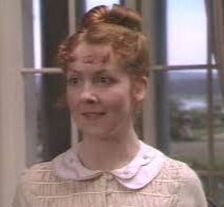 Liz Crowther as Julia Bertram, 1983 Secondly, when Austen does comment on the action in her stories, or talk to us about her characters, these rare occasions should be noted.
Liz Crowther as Julia Bertram, 1983 Secondly, when Austen does comment on the action in her stories, or talk to us about her characters, these rare occasions should be noted.I think we can safely conclude that when she addresses her readers directly, she is pointing something out to us, something she thinks is important.
There are more of these moments of direct comment from Austen in Mansfield Park than in any other of Austen's novels.
Almost invariably, her editorial interjections in Mansfield Park have to do (broadly speaking) with education and the consequences of a faulty upbringing.
Below I've quoted one of the most notable examples but I will discuss these authorial interjections in greater detail further along; “The politeness which [Julia Bertram] had been brought up to practise as a duty made it impossible for her to escape [the boring company of Mrs. Rushworth]; while the want of that higher species of self-command, that just consideration of others, that knowledge of her own heart, that principle of right, which had not formed any essential part of her education, made her miserable under it." In addition, the topic of education arises in dialogue: “’I know [Mary Crawford’s] disposition to be as sweet and faultless as your own,’ [Edmund tells Fanny] but the influence of her former companions makes her seem—gives to her conversation, to her professed opinions, sometimes a tinge of wrong…’
“’The effect of education,’ said Fanny gently.” In short, Mansfield Park is an exploration of the consequences of faulty education. The Bertrams neglected the formation of their daughters’ characters. Henry and Mary Crawford are also brought up in ignorance of virtuous principles. The Bertram girls and the Crawfords are intelligent people, and the Crawfords are witty and discerning. But they are all flawed human beings. The novel lays out the circumstances which lead to Maria Bertram's elopement with Henry Crawford, and the consequences that arose from it.
I’ll expand on this idea, and compare Mansfield Park to some other novels of this period that took up the same theme, in future posts. I'll be talking about the Regency version of nature versus nurture, Regency ideas about intelligence and knowledge, the vast gulf between Regency notions of female chastity and the present day, how education is tied to social class, and the debate around female education and accomplishments in Austen's time. In my variation on Mansfield Park, A Contrary Wind, we briefly meet Miss Lee, the Bertrams' former governess, who is an off-stage character in Austen's novel. We learn a little about her backstory too. Click here for more about my books. Harriet and Ellen of the Reading Jane Austen podcast have begun their close reading of Mansfield Park.
Maggie and Kristin of First Impressions podcast have three episodes on Mansfield Park and more episodes on the various adaptations of the novel. The first episode is here . Both podcasts are a treat for Austenites.
Clutching My Pearls is about Jane Austen and the times she lived in. The opinions are mine, but I don't claim originality. Much has been written about Austen. Click here for the first in the series.
Published on January 02, 2022 00:00
December 16, 2021
CMP#79 My Article in Persuasions On-line
 Clutching My Pearls is my ongoing blog series about my take on Jane Austen’s beliefs and ideas, as based on her novels. I’ve also been blogging about now-obscure female authors of the long 18th century. For more, click "Authoresses" on the menu at right. Click here for the first in the series.
CMP#79 Jane Austen and Elizabeth Helme
Clutching My Pearls is my ongoing blog series about my take on Jane Austen’s beliefs and ideas, as based on her novels. I’ve also been blogging about now-obscure female authors of the long 18th century. For more, click "Authoresses" on the menu at right. Click here for the first in the series.
CMP#79 Jane Austen and Elizabeth Helme
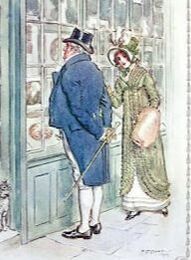 The Jane Austen Society of North America has published my article "Admiral Croft and the Rich Uncle" in their December online edition of Persuasions. The article is about some striking similarities that I've come across between a 1799 novel by Elizabeth Helme and two of Austen's novels.
The Jane Austen Society of North America has published my article "Admiral Croft and the Rich Uncle" in their December online edition of Persuasions. The article is about some striking similarities that I've come across between a 1799 novel by Elizabeth Helme and two of Austen's novels.I previously wrote about Elizabeth Helme in this blog post. She was a hard-working author who enjoyed considerable popular success although she died in illness and poverty. I would not say that Helme was an influence on Austen in the sense that Austen emulated her. I would not compare Helme to Samuel Johnson, Cowper, or Fanny Burney--all writers whom Austen particularly admired. However, I think the evidence is clear that Austen read Helme's novels and made use of some of her dialogue, characters, and plot contrivances.
In this case, the novel I'm speaking of is called Albert, or, The Wilds of Strathnavern. It contains a rich uncle, a character named Colonel O'Bryen, who I argue is the prototype of Admiral Croft.
Albert also makes use of private theatricals for plot purposes. Other Austen scholars have pointed to other contemporary novels which mention private theatricals as the possible source for Austen's use of them in Mansfield Park, but in Albert, the private theatricals are--as with Maria Bertram and Henry Crawford--used for the purposes of seduction.... Here is what The New London Review had to say about Albert: "There is some ingenuity in the construction of this novel, and an agreeable diversity in the dramatis personae, that entitles its author to be ranked, though not in the first, yet not below the second class of novelists. Her language, however, is frequently incorrect, and sometimes, we think unnecessarily debased by colloquial expletives and barbarisms." (This is a reference to Colonel O'Bryen's dialogue. He says "Zounds" and "What the Pie" a lot.)
Another reviewer wrote: "This novel contains little originality or strength of character but it is amusing in its story, and respectable for the propriety of moral sentiment. Many false notions of honour are properly exposed, and the vices of dissipation are painted with a truth of colouring that confers equal credit on the intentions and the abilities of the authoress."
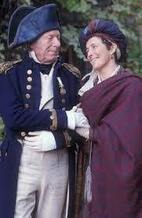 Austen's happiest couple I won't recap my entire article here, but I will add that an alternate or additional source of inspiration for Admiral Croft's sanguine attitude to matrimony might be that sailors apparently had the reputation for quick courtships in general. In an 1817 novel, Elizabeth, Her Lover and Husband, Captain Beverly marries in haste: “With the proverbial carelessness of a sailor, he married a widow lady, after having seen her three times at a place of public amusement…. This union was productive of but little happiness-contracted without any knowledge on his side of her character, habits, or pursuits, and on hers from pecuniary, or, as they are sometimes called, prudential considerations.”
Austen's happiest couple I won't recap my entire article here, but I will add that an alternate or additional source of inspiration for Admiral Croft's sanguine attitude to matrimony might be that sailors apparently had the reputation for quick courtships in general. In an 1817 novel, Elizabeth, Her Lover and Husband, Captain Beverly marries in haste: “With the proverbial carelessness of a sailor, he married a widow lady, after having seen her three times at a place of public amusement…. This union was productive of but little happiness-contracted without any knowledge on his side of her character, habits, or pursuits, and on hers from pecuniary, or, as they are sometimes called, prudential considerations.” Of course, Admiral and Mrs. Croft's marriage worked out very well. They are an entirely devoted couple.
I had known that sailors had the reputation of spending their money quickly once they reached port, and some kept a girl in every port, but perhaps they also had a reputation for hasty marriages. If there is a specific proverb about sailors and carelessness, I don't know about it. Speaking of proverbs, Admiral Croft uses the expression: "breaking a head and giving a plaster," meaning to give someone an injury and then offer them a remedy for the injury. Plasters, plaisters, or poultices, were called "emplastrums" by doctors and apothecaries. These were topical mixtures which could be prepared at home and applied to various parts of the body. The best-known example is the mustard plaster for chest colds and coughs. In the TV series Tales from the Green Valley, domestic historian Ruth Goodman prepares a mustard plaster for her colleague Alex Langlands (at 20:00). She adds that most home remedies were merely placebos. "Mind you," she says, "one shouldn't underestimate the power of a placebo." Happy Holidays to all. Barring breaking news, Clutching My Pearls will resume in the New Year.
Published on December 16, 2021 00:00
December 5, 2021
CMP#78 "The Common Trash of Novels"
 "As for the common trash of novels, under which the press has groaned, which have introduced so wretched a taste of reading, and have been so hurtful to young minds, particularly of the female sex, they are unworthy to be named, except in the way of censure."
"As for the common trash of novels, under which the press has groaned, which have introduced so wretched a taste of reading, and have been so hurtful to young minds, particularly of the female sex, they are unworthy to be named, except in the way of censure."-- The English Review, Or, An Abstract of English and Foreign Literature, Vol V, 1785 CMP#78 A Novel Satire from 1818
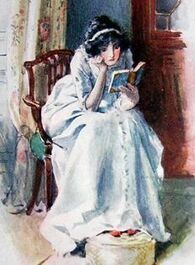 Catherine Morland engrossed in a novel When Jane Austen wrote in Northanger Abbey about book reviewers who "talk in threadbare strains of the trash with which the press now groans," she wasn't exaggerating. Reviewers in periodicals and journals during this period often expressed their contempt for novels in exactly these terms.
Catherine Morland engrossed in a novel When Jane Austen wrote in Northanger Abbey about book reviewers who "talk in threadbare strains of the trash with which the press now groans," she wasn't exaggerating. Reviewers in periodicals and journals during this period often expressed their contempt for novels in exactly these terms. Charles Robert Maturin was a writer of gothic novels. But he was also one of the critics who wrote dismissively of sentimental novels and the people who read them and wrote them.
“The path of novel-writing once laid open was imagined easy by all, and for about forty years the press was deluged with works to which we believe the literary history of no other country could produce a parallel. The milliner’s prentices who had expended their furtive hours, and drenched their maudlin fancies with tales of kneeling lords and ranting baronets at the feet of fair seamstresses, fair as they believed themselves to be, and in narrow back parlours as dark as their own, soon found it easy to stain the well-thumbed pages of a circulating library book with flimsy sentiments, and loose descriptions of their own..."
Just like Austen, Maturin wrote a pretty funny parody of this type of novel. Read on for more...
 The Novel Reading, Josef Danhauser Austen famously defended the novel as "some work in which the greatest powers of the mind are displayed, in which the most thorough knowledge of human nature, the happiest delineation of its varieties, the liveliest effusions of wit and humour, are conveyed to the world in the best-chosen language." She also wrote a satirical outline of sentimental novels, poking fun at the tropes of the genre. If you haven't read it, it's here.
The Novel Reading, Josef Danhauser Austen famously defended the novel as "some work in which the greatest powers of the mind are displayed, in which the most thorough knowledge of human nature, the happiest delineation of its varieties, the liveliest effusions of wit and humour, are conveyed to the world in the best-chosen language." She also wrote a satirical outline of sentimental novels, poking fun at the tropes of the genre. If you haven't read it, it's here.Austen wrote her parody for private family amusement, but the above-quoted critic, Charles Robert Maturin, published an extended satire of sentimental novels, specifically the epistolary novel.
The entire satire is here, and I have excerpted most of it below.
“The heroine must be exquisitely, unimaginably beautiful, though two chapters are usually devoted to the description of her charms, or, as we should word it, “her transparent loveliness:” on the subject of her eyes being black or blue, we find nearly a division of authorities, and therefore do not dare to decide on a question of such delicate importance…
"She must be an orphan (if a foundling, so much the better), left mysteriously in the care of some opulent and noble family, who most unaccountably (considering their character for prudence) suffer her to board and lodge with them, and water her geraniums until the decisive age of sixteen, though conscious that the noble and enamoured heir of the family has been in love with her from their mutual cradles, which by a malicious contrivance of Cupid were placed next each other in the nursery.
"Now comes on the trying part of the business, the heroine is distracted by the ambition of the father, the pride of the mother, and the jealous insults of the sisters, not forgetting a snug misery of her own arising from the persecution of some desperate baronet, who, every night leaps the garden wall for the cold consolation of seeing the farthing candle twinkle in his mistress’s garret, where she weeps over the indignity of proposals urged by the steward’s nephew in the house, or the grocer’s heir in the village, to whom all the family…. are resolved on uniting her as a punishment for her presumption, and a security against their own disgrace. This supposed lover, this interloper in Cupid’s territories, must…. [have] a squint, and red hair, but in any case his legs must be bandy.
"Persecuted by love and hatred, she flies, flies over mountains without a stain on her white satin slippers, and is rumbled two hundred miles in a stage coach without a rent in her gossamer drapery. She must be run away with five or six times before she reaches the end of her journey (a trifling interruption, as she happens not to know where she is flying to), and it is on such occasions that she displays that extraordinary contrast of physical debility and mental independence, of fragility and hardihood, that constitutes the very essence of a novel heroine.
 "Overturning carriage in front of Vienna," Anonymous “She is intoxicated with the smell of a lily, and faints at the murmurs of an Eolian harp, she melts in elegy over a dying linnet… [she] lies down in her clothes, which never require washing or mending, in spite of being made to do double duty, watches through the nights, and weeps through the day, without any diminution of the lustre of the eye…
"Overturning carriage in front of Vienna," Anonymous “She is intoxicated with the smell of a lily, and faints at the murmurs of an Eolian harp, she melts in elegy over a dying linnet… [she] lies down in her clothes, which never require washing or mending, in spite of being made to do double duty, watches through the nights, and weeps through the day, without any diminution of the lustre of the eye…"[A]nd after all this, she has resolution enough, though she never drew a trigger, to hold a loaded pistol to the head of her profligate seducer; to burst, scramble, and tear her way through casement, thicket, forest, and fence, to secure her retreat; and then, with the strength of a horse and the courage of a lion, to seat herself, without a sous in her pocket on the top of a stage-coach….
"When the vehicle breaks down (for this it must do) she can tramp in her silk stocking feet, and her whole wardrobe in a cambric handkerchief (that has never been washed but in her tears) straight up Piccadilly, and then new troubles begin: every gentleman she sees follows her, and, at last, sinking under the consciousness of beauty, misfortune, and wet feet, she trembles, totters, or glides into the back parlour of a shop in the Strand, to beg for a glass of water; for heroines at the last gasp must never take anything stronger; finds a congenial soul in the interesting face of the shopkeeper, who, with incredible liberality, offers her a gratuitous asylum (so like London shopkeepers) and, lovely and humble… she takes her station in a slip of a room where half the peerage crowd the shop every day to peep at her through a canvass blind.
 The Lace Maker, Charles-Amable Lenoir "Here she maintains herself by her marvelous talents in embroidering or painting fan-sticks, the sale exceeding not only possibility, but even her utmost expectations….
The Lace Maker, Charles-Amable Lenoir "Here she maintains herself by her marvelous talents in embroidering or painting fan-sticks, the sale exceeding not only possibility, but even her utmost expectations…."At length, the interesting matron turns out a procuress in due form; and in spite of the industry and taste of the heroine (which by this time ought to have secured her a comfortable property in the three per cents) arrests her for board and lodging, or charges her with theft, drags her before a magistrate, and just as she is about to be fully committed... the magistrate ogling at her all the while, and is disappearing through one door, the hero enters through the other, clasps her to his bosom… swears that nothing shall divide them, and in proof of his asseveration draws his sword...
"[I]n the struggle, her wig or her handkerchief (we forget which) drops off, and her mole cinque-spotted, or strawberry-mark, or something equally conclusive or satisfactory, is discovered, by which she is proved to be a duke’s daughter or a peeress in her own right; her noble family in the same breath recognize her, and give their consent to her marriage; her disappointed lovers, one and all, pair off with the “sweet friends,” into whose sympathizing ears her epistolary sorrows have been poured through five volumes.
"The ten last pages are devoted to a description of the dress for the wedding; much honourable mention is made of white satin, and due notice of hartshorn…" I've been reading a lot of the literature of the long 18th century and I've enjoyed getting to know its tropes, improbabilities, and conventions myself, so I enjoyed Maturin's parody. I laughed when I read the part about the heroine watering her geraniums because Fanny Price has geraniums in the East Room! This satire appeared in the British Review and London Critical Journal (1818), and was quoted in The Oxford History of the Novel in English (2011). And yes, I've read 18th century novels which employ one or more of these tropes.
Although this is a satire, I think we can learn from it, because it is a distillation of dozens and dozens of novels. We recognize the theme of the heroine as damsel in distress who is buffeted about by fortune but maintains her dignity and of course her chastity. The theme of the orphan or foundling is also apparent. The friendless situation of Fanny Price in the great house at Mansfield is hardly unique in the literature of the long 18th century. The heroine gets her reward in the end and it means she no longer has to work for a living; her rank and status in society is confirmed and she marries her Prince Charming.
This is one reason why I am skeptical of feminist interpretations of--for example--Fanny Price in Mansfield Park. Why are modern scholars so certain that Fanny's relationship with the overbearing Sir Thomas must be an allegory of slavery? If Fanny is an allegorical enslaved person, then what about the literally hundreds of other heroines in similar straits? Are they also representative of chattel slavery? Or, are they variations on the standard Cinderella story? To quote from my Quillette article: Dependent, poverty-stricken relatives were ubiquitous in life and in novels, but Mansfield Park‘s Fanny Price is not just another poor English girl, she’s the “white counterpart” of a slave (an argument made by Moira Ferguson in an influential 1991 essay)... To take one of many examples, in a recent article, Sarah Marsh says when Sir Thomas tells Fanny to leave the ballroom with “the voice of absolute power,” Austen is reminding us of a “system that grants English enslavers absolute power over their human chattels.” Opinions in anti-racist discourse are evolving rapidly, so I suggest that anyone planning to compare white girls dancing at balls to enslaved Africans might want to think again. I think it's crucial to look at what Austen was doing with her plots and characters in comparison to other novels of her period, before drawing conclusions that she was doing something subversive or unique in terms of illustrating the injustices which beset dependent young females. I've banged on this drum before and will no doubt do it again! More blog posts about the dangers of reading novels, particularly romance novels, here and here . The Oxford History of the Novel in English attributes the essay I've quoted from to Charles Robert Maturin, (1780-1824) Maturin himself wrote gothic novels, so, like Austen, he could enjoy novels while laughing at them, I suppose. And he had a wife and four children to support.
Published on December 05, 2021 00:00
CMP#78 A Novel Satire
 "As for the common trash of novels, under which the press has groaned, which have introduced so wretched a taste of reading, and have been so hurtful to young minds, particularly of the female sex, they are unworthy to be named, except in the way of censure."
"As for the common trash of novels, under which the press has groaned, which have introduced so wretched a taste of reading, and have been so hurtful to young minds, particularly of the female sex, they are unworthy to be named, except in the way of censure."-- The English Review, Or, An Abstract of English and Foreign Literature, Vol V, 1785 CMP#78 A Novel Satire from 1818
 Catherine Morland engrossed in a novel When Jane Austen wrote in Northanger Abbey about book reviewers who "talk in threadbare strains of the trash with which the press now groans," she wasn't exaggerating. Reviewers in periodicals and journals during this period often expressed their contempt for novels in exactly these terms.
Catherine Morland engrossed in a novel When Jane Austen wrote in Northanger Abbey about book reviewers who "talk in threadbare strains of the trash with which the press now groans," she wasn't exaggerating. Reviewers in periodicals and journals during this period often expressed their contempt for novels in exactly these terms. Charles Robert Maturin was a writer of gothic novels. But he was also one of the critics who wrote dismissively of sentimental novels and the people who read them and wrote them.
“The path of novel-writing once laid open was imagined easy by all, and for about forty years the press was deluged with works to which we believe the literary history of no other country could produce a parallel. The milliner’s prentices who had expended their furtive hours, and drenched their maudlin fancies with tales of kneeling lords and ranting baronets at the feet of fair seamstresses, fair as they believed themselves to be, and in narrow back parlours as dark as their own, soon found it easy to stain the well-thumbed pages of a circulating library book with flimsy sentiments, and loose descriptions of their own..."
Just like Austen, Maturin wrote a pretty funny parody of this type of novel. Read on for more...
 The Novel Reading, Josef Danhauser Austen famously defended the novel as "some work in which the greatest powers of the mind are displayed, in which the most thorough knowledge of human nature, the happiest delineation of its varieties, the liveliest effusions of wit and humour, are conveyed to the world in the best-chosen language." She also wrote a satirical outline of sentimental novels, poking fun at the tropes of the genre. If you haven't read it, it's here.
The Novel Reading, Josef Danhauser Austen famously defended the novel as "some work in which the greatest powers of the mind are displayed, in which the most thorough knowledge of human nature, the happiest delineation of its varieties, the liveliest effusions of wit and humour, are conveyed to the world in the best-chosen language." She also wrote a satirical outline of sentimental novels, poking fun at the tropes of the genre. If you haven't read it, it's here.Austen wrote her parody for private family amusement, but the above-quoted critic, Charles Robert Maturin, published an extended satire of sentimental novels, specifically the epistolary novel.
The entire satire is here, and I have excerpted most of it below.
“The heroine must be exquisitely, unimaginably beautiful, though two chapters are usually devoted to the description of her charms, or, as we should word it, “her transparent loveliness:” on the subject of her eyes being black or blue, we find nearly a division of authorities, and therefore do not dare to decide on a question of such delicate importance…
"She must be an orphan (if a foundling, so much the better), left mysteriously in the care of some opulent and noble family, who most unaccountably (considering their character for prudence) suffer her to board and lodge with them, and water her geraniums until the decisive age of sixteen, though conscious that the noble and enamoured heir of the family has been in love with her from their mutual cradles, which by a malicious contrivance of Cupid were placed next each other in the nursery.
"Now comes on the trying part of the business, the heroine is distracted by the ambition of the father, the pride of the mother, and the jealous insults of the sisters, not forgetting a snug misery of her own arising from the persecution of some desperate baronet, who, every night leaps the garden wall for the cold consolation of seeing the farthing candle twinkle in his mistress’s garret, where she weeps over the indignity of proposals urged by the steward’s nephew in the house, or the grocer’s heir in the village, to whom all the family…. are resolved on uniting her as a punishment for her presumption, and a security against their own disgrace. This supposed lover, this interloper in Cupid’s territories, must…. [have] a squint, and red hair, but in any case his legs must be bandy.
"Persecuted by love and hatred, she flies, flies over mountains without a stain on her white satin slippers, and is rumbled two hundred miles in a stage coach without a rent in her gossamer drapery. She must be run away with five or six times before she reaches the end of her journey (a trifling interruption, as she happens not to know where she is flying to), and it is on such occasions that she displays that extraordinary contrast of physical debility and mental independence, of fragility and hardihood, that constitutes the very essence of a novel heroine.
 "Overturning carriage in front of Vienna," Anonymous “She is intoxicated with the smell of a lily, and faints at the murmurs of an Eolian harp, she melts in elegy over a dying linnet… [she] lies down in her clothes, which never require washing or mending, in spite of being made to do double duty, watches through the nights, and weeps through the day, without any diminution of the lustre of the eye…
"Overturning carriage in front of Vienna," Anonymous “She is intoxicated with the smell of a lily, and faints at the murmurs of an Eolian harp, she melts in elegy over a dying linnet… [she] lies down in her clothes, which never require washing or mending, in spite of being made to do double duty, watches through the nights, and weeps through the day, without any diminution of the lustre of the eye…"[A]nd after all this, she has resolution enough, though she never drew a trigger, to hold a loaded pistol to the head of her profligate seducer; to burst, scramble, and tear her way through casement, thicket, forest, and fence, to secure her retreat; and then, with the strength of a horse and the courage of a lion, to seat herself, without a sous in her pocket on the top of a stage-coach….
"When the vehicle breaks down (for this it must do) she can tramp in her silk stocking feet, and her whole wardrobe in a cambric handkerchief (that has never been washed but in her tears) straight up Piccadilly, and then new troubles begin: every gentleman she sees follows her, and, at last, sinking under the consciousness of beauty, misfortune, and wet feet, she trembles, totters, or glides into the back parlour of a shop in the Strand, to beg for a glass of water; for heroines at the last gasp must never take anything stronger; finds a congenial soul in the interesting face of the shopkeeper, who, with incredible liberality, offers her a gratuitous asylum (so like London shopkeepers) and, lovely and humble… she takes her station in a slip of a room where half the peerage crowd the shop every day to peep at her through a canvass blind.
 The Lace Maker, Charles-Amable Lenoir "Here she maintains herself by her marvelous talents in embroidering or painting fan-sticks, the sale exceeding not only possibility, but even her utmost expectations….
The Lace Maker, Charles-Amable Lenoir "Here she maintains herself by her marvelous talents in embroidering or painting fan-sticks, the sale exceeding not only possibility, but even her utmost expectations…."At length, the interesting matron turns out a procuress in due form; and in spite of the industry and taste of the heroine (which by this time ought to have secured her a comfortable property in the three per cents) arrests her for board and lodging, or charges her with theft, drags her before a magistrate, and just as she is about to be fully committed... the magistrate ogling at her all the while, and is disappearing through one door, the hero enters through the other, clasps her to his bosom… swears that nothing shall divide them, and in proof of his asseveration draws his sword...
"[I]n the struggle, her wig or her handkerchief (we forget which) drops off, and her mole cinque-spotted, or strawberry-mark, or something equally conclusive or satisfactory, is discovered, by which she is proved to be a duke’s daughter or a peeress in her own right; her noble family in the same breath recognize her, and give their consent to her marriage; her disappointed lovers, one and all, pair off with the “sweet friends,” into whose sympathizing ears her epistolary sorrows have been poured through five volumes.
"The ten last pages are devoted to a description of the dress for the wedding; much honourable mention is made of white satin, and due notice of hartshorn…" I've been reading a lot of the literature of the long 18th century and I've enjoyed getting to know its tropes, improbabilities, and conventions myself, so I enjoyed Maturin's parody. I laughed when I read the part about the heroine watering her geraniums because Fanny Price has geraniums in the East Room! This satire appeared in the British Review and London Critical Journal (1818), and was quoted in The Oxford History of the Novel in English (2011). And yes, I've read 18th century novels which employ one or more of these tropes.
Although this is a satire, I think we can learn from it, because it is a distillation of dozens and dozens of novels. We recognize the theme of the heroine as damsel in distress who is buffeted about by fortune but maintains her dignity and of course her chastity. The theme of the orphan or foundling is also apparent. The friendless situation of Fanny Price in the great house at Mansfield is hardly unique in the literature of the long 18th century. The heroine gets her reward in the end and it means she no longer has to work for a living; her rank and status in society is confirmed and she marries her Prince Charming.
This is one reason why I am skeptical of feminist interpretations of--for example--Fanny Price in Mansfield Park. Why are modern scholars so certain that Fanny's relationship with the overbearing Sir Thomas must be an allegory of slavery? If Fanny is an allegorical enslaved person, then what about the literally hundreds of other heroines in similar straits? Are they also representative of chattel slavery? Or, are they variations on the standard Cinderella story? To quote from my Quillette article: Dependent, poverty-stricken relatives were ubiquitous in life and in novels, but Mansfield Park‘s Fanny Price is not just another poor English girl, she’s the “white counterpart” of a slave (an argument made by Moira Ferguson in an influential 1991 essay)... To take one of many examples, in a recent article, Sarah Marsh says when Sir Thomas tells Fanny to leave the ballroom with “the voice of absolute power,” Austen is reminding us of a “system that grants English enslavers absolute power over their human chattels.” Opinions in anti-racist discourse are evolving rapidly, so I suggest that anyone planning to compare white girls dancing at balls to enslaved Africans might want to think again. I think it's crucial to look at what Austen was doing with her plots and characters in comparison to other novels of her period, before drawing conclusions that she was doing something subversive or unique in terms of illustrating the injustices which beset dependent young females. I've banged on this drum before and will no doubt do it again! More blog posts about the dangers of reading novels, particularly romance novels, here and here . The Oxford History of the Novel in English attributes the essay I've quoted from to Charles Robert Maturin, (1780-1824) Maturin himself wrote gothic novels, so, like Austen, he could enjoy novels while laughing at them, I suppose. And he had a wife and four children to support.
Published on December 05, 2021 00:00
November 28, 2021
CMP#77 Book Review: A Winter in London
 This post continues my exploration of the literature of Jane Austen's contemporaries. Here's another long 18th century book review, this time for a "novel of fashion." CMP#77 A WINTER IN LONDON -- Three Genres in One
This post continues my exploration of the literature of Jane Austen's contemporaries. Here's another long 18th century book review, this time for a "novel of fashion." CMP#77 A WINTER IN LONDON -- Three Genres in One
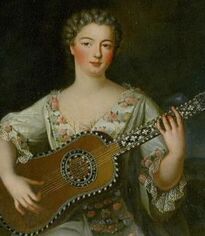 A Winter in London (1806) by Thomas Skinner Surr is a peculiar blend of a novel, with a melodramatic quasi-gothic plot awkwardly rubbing shoulders with celebrity gossip and social criticism. By quasi-gothic, I mean that there is nothing supernatural in the plot, but there is treachery, a villainous foreigner, anti-clericalism, titillating hints of incest narrowly averted, and a dungeon or two. The young hero, Edward Montagu, is a foundling.
A Winter in London (1806) by Thomas Skinner Surr is a peculiar blend of a novel, with a melodramatic quasi-gothic plot awkwardly rubbing shoulders with celebrity gossip and social criticism. By quasi-gothic, I mean that there is nothing supernatural in the plot, but there is treachery, a villainous foreigner, anti-clericalism, titillating hints of incest narrowly averted, and a dungeon or two. The young hero, Edward Montagu, is a foundling.The handy thing about a Georgian-era foundling narrative is that you can show the foundling as a plucky and virtuous character struggling to find their way in a society based on birth and rank rather than merit, but, in the Big Reveal of True Parentage, you can explain that the foundling IS of good birth! Their good looks, excellent character and intelligence had to come from somewhere, after all.
Are novels about foundlings an attempt to subvert the social order, or does the Big Reveal reinforce the social order? Is this a way of having your cake and eating it too?
Tom Jones, the foundling in Fielding’s 1749 novel, is of illegitimate birth but other foundlings such as Edward Evilen (1796) or Rosalie in the Mystic Cottager of Chamouny (1795) and Edward Montague of A Winter in London all have married parents who have been separated through some combination of bad luck and perfidy. The Big Reveal comes about as a result of amazing coincidence: the lovely Rosalie strums her guitar in the Swiss Alps until the one person in the world she wasn't supposed to meet seeks lodging in her remote cottage. Edward Montagu is raised in a cottage within sight of his true ancestral home. He accidentally meets his father--who wrongly thinks his wife, Edward's mother, was unfaithful to him--while they are both roaming moodily around the neighbourhood. “'I-I, your father!' said the stranger, breaking from the arms of Edward, which entwined his knees. 'No—poor wretch! Thou art the fruit of crime, the offspring of adultery! Thou hast no parents; for thy guilty mother and her paramour, thy father, perished in that hour when thou wast rescued from destruction.'”
[At this horrible news], "Edward, relinquishing his hold, fell prostrate on the earth… the mysterious stranger, with a wild shriek of despair, smiting his forehead, exclaimed, 'Where, where shall I fly to escape from misery!' and in a moment he was out of sight.” More high drama ensues before everything and everyone is sorted out, and Dad continues to use the gothic convention of using “thou” and “wast” instead of “you” and “were” in moments of high emotion. As for the hint of incest I mentioned, I've come across several foundling novels in which the young man falls in love with a beautiful girl, and it appears for a time that she must really be his sister or half-sister, but she isn't. I had no idea that so many writers teased their readers with incestuous love. In her guide to gothic novels , Ann B. Tracy's index has many entries for incest. These entries distinguish between "Incest: Actual" and "Incest: Literary Flirtation with, including false alarms, foiled attempts, threats, and unconsummated incestuous passion."
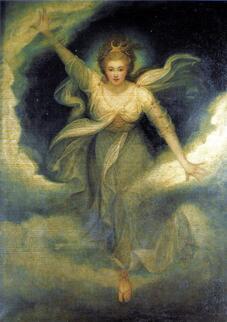 Georgiana, Duchess of Devonshire in costume, by Maria Cosway
Decadent London, tsk, tsk, tsk
Georgiana, Duchess of Devonshire in costume, by Maria Cosway
Decadent London, tsk, tsk, tsk
The title, A Winter in London, does not refer to the gothic-y foundling plot but to a separate and major theme of the novel: the vapid, dissolute world of the London ton in which everybody is absolutely miserable, caught in a vortex of dissipation and consumed with envy of those higher on the social ladder than themselves. The London-based characters are gossiping, quarrelsome, and extravagant, partying at night and sleeping during the day, running up gambling debts, ignoring the bill-collectors pounding on their doors, etc., etc. This genre of novel is called "novel of fashion," or a novel of fashionable life.
Surr’s leading exemplar of this decadent lifestyle the Duchess of Belgrave, a character said to be based upon Georgiana, Duchess of Devonshire. The duchess died not long after the book came out, and some said she was hastened to her grave because of Surr's satirical portrait. Another minor character is a thinly-veiled portrait of successful society physician, Sir Walter Farquhar.
Just as foundlings are both a rebuke and a reinforcement of the class system, so Surr criticizes London society while at the same time providing his readers with enticing descriptions of the lifestyles of the rich and famous. He gives a lengthy description of a lavish masked ball, with “superb” decorations and costumes.
“Passing through this apartment [fitted up to look like a Moorish palace], the visitor next entered a long gallery, which was formed into an Egyptian temple, the effect of which was truly grand and striking…” The branches of the “artificial cypress trees” wave about thanks to “invisible machinery, and thus appeared to be really agitated by the air.”
A pavilion is erected in an indoor garden “built in the rotunda form; the roof was supported by pillars of gold studded with precious stones, around which were entwined wreaths of variegated lamps; from the centre of the dome, which was painted in a masterly style, with the luxuriant representation of every species of oriental fruit, foliage, and flowers, was suspended a superb chandelier, and beneath its trembling splendour, a fountain of curious workmanship played rose-water into golden vases.”
The Duchess of Belgrave attends, dressed as Diana. Our hero Edward looks fetching in tights, and our heroine Emily is a Moorish princess. But as Surr's readers well knew, if you throw a lavish masked ball, you are just asking for trouble. I'll have to do a post in the future about the many plot complications that arise during masked balls.
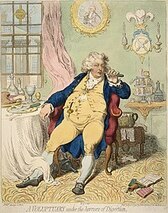 Posterity has not been so kind to the Prince Regent. The Prince of Wales makes several appearances in the novel, including the masked ball. Surr has nothing but great things to say about the future George IV. “The elegant deportment, the graceful manners, the noble mien, and the refined wit, of the most accomplished prince in Europe, were not to be concealed beneath the guise of a Spanish grandee. His royal highness was soon discovered, and wherever he bent his steps, there was the point of attraction.”
Posterity has not been so kind to the Prince Regent. The Prince of Wales makes several appearances in the novel, including the masked ball. Surr has nothing but great things to say about the future George IV. “The elegant deportment, the graceful manners, the noble mien, and the refined wit, of the most accomplished prince in Europe, were not to be concealed beneath the guise of a Spanish grandee. His royal highness was soon discovered, and wherever he bent his steps, there was the point of attraction.”The prince is even shown behaving heroically when the inevitable trouble arises at the ball. Signor Belloni, an evil scheming Italian, stalks our hero Edward. The fair heroine Emily pleads for someone to intervene: "I am sure there is danger of some kind!" The prince responds to her plea “with a gallantry that put the rest of the gentlemen to the blush... His example was electric. Every gentlemen was then ready to rush forth after Edward” who, they discover, has been stabbed in the breast by a poniard. It was definitely the Italian, then. Emily loses no time in doing her part: she "utters a loud shriek," and faints dead away. Thus concludes Volume II.
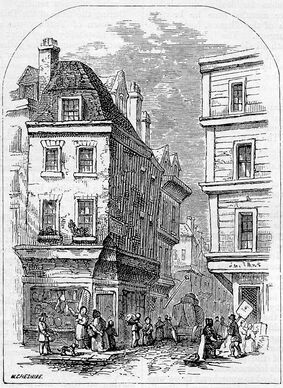 Grub Street, home of aspiring hack writers in London
Characters who editorialize
Grub Street, home of aspiring hack writers in London
Characters who editorialize
In addition to the foundling plot and the “London is a sinkhole of vice” theme, the third thread in this novel is eclectic commentary on the social issues of the day. These dialogues are mostly carried on between wise old Dr. Hoare, who is tutor to a feckless young nobleman, and his old friend, Mr. Ogilvy, with Edward sometimes chiming in. For me, this was the most interesting aspect of the novel.
These conversation cover a broad array of issues. but not colonialism or slavery. The story opens with the shipwreck of an East India trading ship, but this is merely a plot device to introduce the shipwrecked foundling, who is brought ashore by a Chinese man who cannot speak English and who promptly dies.
As for slavery, what could be more neutral or oblique than this passive voice passage: “unhappily a dispute arose among some of the leading men in power, relative to our colonial settlements in the West Indies. Several pamphlets were published on the occasion. Among others my nephew Charles wrote one in defense of the opinions espoused by his patron, which were also honestly his own.”
The key point in this inserted tale isn't the West Indies; the story is an opportunity for Surr to vent his spleen against book reviewers. Poor Charles is crushed when he receives a very personal and sarcastic review. Mr. Ogilvy goes to the editorial office and rebukes the reviewer at length: "No, sir, it was reserved for the present day to bring forth a fry of young critic imps, the mingled spawn of arrogance and envy hatched by mischief, who were to entail disgrace for ever on the word reviewer, by making it synonymous with libeller and assassin.... You may proceed in your career… grin over the collection of hopes destroyed, of fortunes injured, of feelings outraged, of intellects deranged, of hearts broken by your merry malice, or your venomous corruption; enjoy the feast infernal!”"
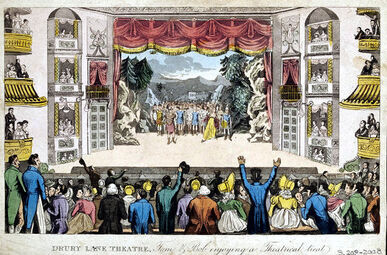 Snarky book reviewers are just one of the issues which appear to exercise Surr more than colonialism or slavery. He also has opinions about the theatre and prison reform.
Snarky book reviewers are just one of the issues which appear to exercise Surr more than colonialism or slavery. He also has opinions about the theatre and prison reform.Dr. Hoare’s friend Mr. Ogilvy criticizes the European custom of having soldiers stationed inside theaters. Better, says Mr. Ogilvy,” that we should be pelted now and then with the rind of an orange, than that our lives should be exposed to the malice or mistake of some hot headed grenadier; --better too that we are occasionally a little incommoded by noise, than that the rude or even riotous jollity of British freedom should be changed to the servile silence or effeminate decency of an enslaved people.”
Female education is also discussed: “I don’t approve of the present system, of making prattling philosophers in petticoats.” [says Mr. Ogilvy] I see no good that is to result to society from having our wives or daughters discharging electric or Galvanic batteries at our heads, or of converting our cookmaids into chemical analysers of smoke and steam.”
“But are not the scientific pursuits of the present day at least as beneficial to society as the old amusements of working carpets and chair bottoms?” doctor Hoare asks, but he is just kidding. He concurs that “it is impossible there should be a difference of opinion” on the subject of females studying the sciences.
Surr is bullish on England and believes it is superior to other countries in terms of social mobility and equality.
“If in one coach you see the family of a duke who have inherited without labour the estates of their ancestors,” Dr. Hoare enthuses, “the very next that follows it will, in all probability, be that of some industrious and fortunate trader, whose splendour, instead of discouraging, animates the spectators, as an emblem of the reward which in this free country is held out, without exception, to the industrious and the enterprising.” (Again, Surr has it both ways when it comes to social mobility. One of the characters is a waiter who works hard, saves money and rises up the world, but he's presented as a sort of scheming, grasping, undereducated skinflint. His son marries the beautiful daughter of a noble family that's fallen on hard times but it's not a love match. There's an ambivalence about the whole thing.)
Surr also counteracts his earlier descriptions of London opulence by having Edward's father, the long-lost duke, inveigh against the heartlessness of the wealthy: “Ah, how many children of misery and woe might the affluent, the skillful, and the powerful rescue from the pallet of disease, the chains of madness, or the debtor’s den, with but a thousandth part of the useless energy wasted in pleasure’s toils!” Topics and Topicality
The Critical Review noted that A Winter in London was in “great demand” at the “circulating libraries,” but called the story “trite,” and filled with clichés. “The little that is not common-place, is improbable.” As for the editorial commentary, the reviewer notes that the sad tale of the young writer who goes mad when his pamphlet gets a snarky review “is introduced abruptly and without having any connection with the story.”
The Monthly Review said of the gothic plot: “Will the Italians ever revenge, or ever redeem, the stigma which our writers almost constantly throw on them, when an individual of that nation has a part to act in the drama?”
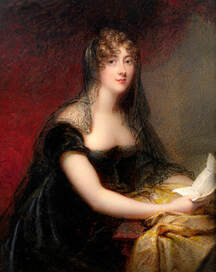 Georgiana, Duchess of Cavendish, by Anne Foldsone Mee I think it was Surr's portraits of real people and the descriptions of London opulence—not the gothic plot and not the topical conversations—which explains why A Winter in London went into at least 13 editions when it came out. (In contrast, only one of Austen’s novels--Mansfield Park--had a second edition and she lost money on when it failed to sell). The topicality of A Winter in London made it popular in its time, but of course this is what makes it seem dated today.
Georgiana, Duchess of Cavendish, by Anne Foldsone Mee I think it was Surr's portraits of real people and the descriptions of London opulence—not the gothic plot and not the topical conversations—which explains why A Winter in London went into at least 13 editions when it came out. (In contrast, only one of Austen’s novels--Mansfield Park--had a second edition and she lost money on when it failed to sell). The topicality of A Winter in London made it popular in its time, but of course this is what makes it seem dated today.While A Winter in London has since fallen into obscurity, one of its characters casts her eye upon posterity. The imitation Duchess of Devonshire character, the Duchess of Belgrave, writes to her sister: “I hope you have carefully preserved the numerous epistles I have written you… it is impossible to estimate how large a fortune they may produce to your posterity in the year of our Lord two thousand and odd… [but] be careful in concealing them at present, lest they should fall into the [wrong] hands before the two hundred years I allude to have rolled over my grave…”
Just as I like dipping into the past, I like the thought of the people of the past thinking about the year "two thousand and odd."
Edward recovers from his stab wound, by the way, and the errors and tragedies of the past are all cleared up. He has the bluest of blue blood, which is more than can be said for Emily, since her dad is nouveaux riche. There is one last-minute further misunderstanding between Edward and Emily, but when that's dealt with, they live happily and wealthily ever after.
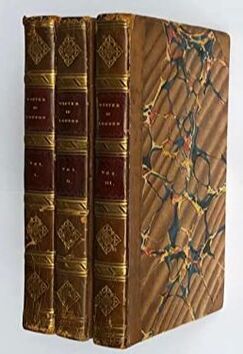 The Wiley Online Library says Thomas Skinner Surr (1770–1847) is "perhaps the most famous author of novels of 'fashionable life'." "[H]his work was a touchstone for debates about the moral and cultural worth of novels." That might explain why he inserted the unrelated debates about the issues of the day; to give his novels additional moral gravitas.
The Wiley Online Library says Thomas Skinner Surr (1770–1847) is "perhaps the most famous author of novels of 'fashionable life'." "[H]his work was a touchstone for debates about the moral and cultural worth of novels." That might explain why he inserted the unrelated debates about the issues of the day; to give his novels additional moral gravitas. In addition to novels, Surr wrote books on the subject of banking. He worked as a clerk in a London bank. His novels sold well but it looks like he kept his day job. His father was a wheelwright and a grocer and his mother was the daughter of a mayor of London, which explains why his name includes his mother's maiden name of "Skinner." He was therefore from the merchant class and never rose to the ranks of the people that he wrote about.
The website: UK Red: The Experience of Reading in England , captures remarks from everyday people from 1940 to 1945, culled from their letters and diaries and other records. Here is the entry for A Winter in London
Published on November 28, 2021 00:00
November 22, 2021
CMP#76: A Guide to Gothic Novels
 Nobody is entirely safe; nothing is secure. The Gothic world is quintessentially the fallen world, the vision of fallen man, living in fear and alienation, haunted by images of his mythic expulsion, by its repercussions, and by an awareness of his unavoidable wretchedness.
Nobody is entirely safe; nothing is secure. The Gothic world is quintessentially the fallen world, the vision of fallen man, living in fear and alienation, haunted by images of his mythic expulsion, by its repercussions, and by an awareness of his unavoidable wretchedness.-- from Ann B. Tracy's introduction
Book Review: The Gothic Novel 1790–1830: Plot Summaries and Index to Motifs “I will read you their names directly; here they are, in my pocketbook." [says Isabelle Thorpe to Catherine Morland] "Castle of Wolfenbach, Clermont, Mysterious Warnings, Necromancer of the Black Forest, Midnight Bell, Orphan of the Rhine, and Horrid Mysteries. Those will last us some time.”
“Yes, pretty well," [answers Catherine] "but are they all horrid, are you sure they are all horrid?”
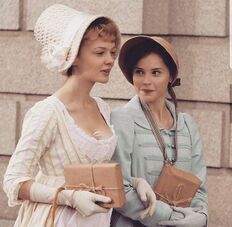 Isabella and Catherine are binge-reading gothic novels in Bath, a popular pastime when Jane Austen wrote her first draft of Northanger Abbey. Because of the long delay before its actual publication in 1817, Austen felt compelled to note in her foreword that "thirteen years have passed since it was finished, many more since it was begun, and that during that period, places, manners, books, and opinions have undergone considerable changes."
Isabella and Catherine are binge-reading gothic novels in Bath, a popular pastime when Jane Austen wrote her first draft of Northanger Abbey. Because of the long delay before its actual publication in 1817, Austen felt compelled to note in her foreword that "thirteen years have passed since it was finished, many more since it was begun, and that during that period, places, manners, books, and opinions have undergone considerable changes."A hundred years later, Isabella Popp tells us , Isabella's seven horrid novels had fallen into such obscurity that they "were often presumed to be invented by Austen." In 1927, "Michael Sadleir, a British publisher, novelist, and book collector, located copies of all seven novels." The last one to surface was Orphans of the Rhine.
This should be a reminder to us that prior to our digital age, finding copies of rare old book was a much more difficult and expensive challenge. Thanks to the internet and thanks to digitization, hundreds of these spine-chilling 18th-century novels are readily available, either for purchase or through your local university or community library.
You can also dive into the world of the gothic novel thanks to Professor Ann B. Tracy and her reference book: The Gothic Novel 1790-1830: Plot Summaries and Index to Motifs.
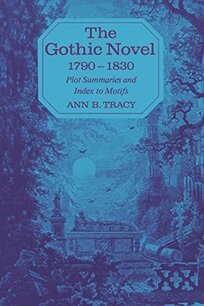 Tracy's introduction is written in clear and engaging prose, not obtuse academic-speak. She expands on the religious underpinnings of the gothic, seeing it as a "fallen world" in which man is "haunted by images of his mythic expulsion." For that reason, I would have expected to see a reference to the anti-Catholicism which pervades so many of these novels. The index has entries and sub-entries for "abbess, bad" and "monk, unusually mysterious," as well as entries and sub-entries for monasteries.
Tracy's introduction is written in clear and engaging prose, not obtuse academic-speak. She expands on the religious underpinnings of the gothic, seeing it as a "fallen world" in which man is "haunted by images of his mythic expulsion." For that reason, I would have expected to see a reference to the anti-Catholicism which pervades so many of these novels. The index has entries and sub-entries for "abbess, bad" and "monk, unusually mysterious," as well as entries and sub-entries for monasteries.Gothic novels are also part travelogue, with depictions of Italian scenery that most readers of the time could not expect to ever visit themselves, and most of the authors of the novels never saw at first-hand, either. "[T]he one place the protagonist almost never finds himself is at home," explains Tracy.
"Do not imagine that you can cope with me in a knowledge of Julias and Louisas," Henry Tilney says to Catherine Morland in Northanger Abbey. Nor could anyone compete with Tracy's knowledge of gothic heroines; she provides an index for the Julias and Louisas, and for the heroes too. All seven of the "horrid" novels which Isabella recommended to Catherine are summarized in this volume and many more besides.
For fun, let's check out one of the openings of Isabella's horrid novels at random from Tracy's guide: here is The Mysterious Warning, by Eliza Parsons, which deals with two well-born brothers by two different mothers.
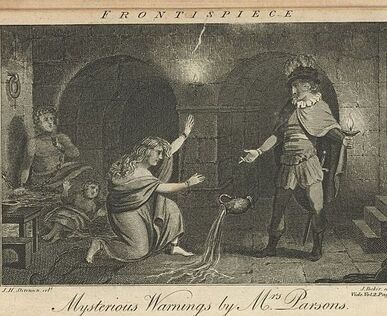 "As the novel begins, the boys, now grown, are very different from each other; briefly, Rhodophil is bad, Ferdinand good. But Rhodophil is so accomplished a hypocrite that Ferdinand fails to see through his displays of fraternal affection. When Claudina, whom they both fancy, chooses and marries Ferdinand, Rhodophil makes a show of soliciting his father’s pardon for Ferdinand’s unprofitable match. In fact, he manages to keep the two from reconciliation and causes Ferdinand to miss a deathbed blessing. Further, he hides the latest will and magnanimously buys Ferdinand a commission in the army. This enables him to keep and seduce his sister-in-law.
"As the novel begins, the boys, now grown, are very different from each other; briefly, Rhodophil is bad, Ferdinand good. But Rhodophil is so accomplished a hypocrite that Ferdinand fails to see through his displays of fraternal affection. When Claudina, whom they both fancy, chooses and marries Ferdinand, Rhodophil makes a show of soliciting his father’s pardon for Ferdinand’s unprofitable match. In fact, he manages to keep the two from reconciliation and causes Ferdinand to miss a deathbed blessing. Further, he hides the latest will and magnanimously buys Ferdinand a commission in the army. This enables him to keep and seduce his sister-in-law. "When Ferdinand comes home on leave, a mysterious voice (belonging to Ernest the discerning servant) tells him to flee Claudina as he would sin and death. She agrees that this warning is justified and goes to a convent without letting Ferdinand know where.
"In the course of subsequent melancholy wandering, Ferdinand finds and rescues a couple who for twelve years have been locked in separate dungeons by a sadistic recluse. The male victim, Count M--, becomes Ferdinand’s companion after his wife decides to go into a convent. They meet two girls, one of whom (Louisa) has been victimized by wicked Count Wolfran, who married, discarded, denied, and imprisoned her...."
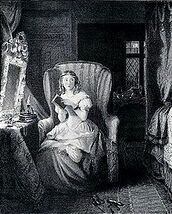 This reference guide to the gothic novels of yesteryear is not necessarily a book you'd read cover-to-cover. It's fun to dip into here and there, to enjoy the plot summaries and especially to read over the index to motifs. Tracy has built a comprehensive index of popular gothic tropes which have a fun, tongue-in-cheek quality. The entry for "skeleton" for example, includes sub-entries for:
This reference guide to the gothic novels of yesteryear is not necessarily a book you'd read cover-to-cover. It's fun to dip into here and there, to enjoy the plot summaries and especially to read over the index to motifs. Tracy has built a comprehensive index of popular gothic tropes which have a fun, tongue-in-cheek quality. The entry for "skeleton" for example, includes sub-entries for:"skeleton, animated; at banquet; in bed with; in closet; costumed; in dungeon; hand of, clutching murder weapon; hanging; in quantity; spectral; in trunk; wearing familiar ring."
I am going to check out the novels listed under "novels, reading, dangers of," to find more examples of those authors who, as Jane Austen complained, degrade "by their contemptuous censure the very performances, to the number of which they are themselves adding." More on the dangers of novel-reading here. As Professor John Mullan points out in this lecture, the Scooby Doo plot, in which the supernatural threat turns out to be a contrivance of the villain, is a direct descendant of Ann Radcliffe's gothic novels. ("And I would have gotten away with it too, if it weren't for you pesky kids!")
In A Marriage of Attachment, my second novel of the Mansfield Trilogy, Fanny Price is alone in an empty warehouse at night and is spooked by thoughts of the Ratcliffe Highway murderer, who is at large in London. Click here for more about my books.
Published on November 22, 2021 00:00
November 15, 2021
CMP#75: The Perils of Petticoat Government
 Austen scholars: “Austen’s novels are preoccupied with class and wealth in England!”
Austen scholars: “Austen’s novels are preoccupied with class and wealth in England!”Silver Fork novelists: “Hold my beer.” Book Review: Mrs. Armytage, or, Female Domination, by Catherine Gore
 Formidable dowager (A portrait of Victorian art expert Mary Doyle, not Mrs. Armytage, but you get the idea) Mrs. Armytage (1831) by Catherine Gore is a three-volume novel of the “Silver Fork” school, meaning that it's a novel set in the upper echelons of English society and it follows the lifestyles of the rich and titled. Actually, Gore’s descriptions of country estate life, racing meets, carriages, and sprightly, cynical conversation are the least interesting parts of this story: the chief interest arises out of a clash of conflicting personalities. This is very much a character-driven novel.
Formidable dowager (A portrait of Victorian art expert Mary Doyle, not Mrs. Armytage, but you get the idea) Mrs. Armytage (1831) by Catherine Gore is a three-volume novel of the “Silver Fork” school, meaning that it's a novel set in the upper echelons of English society and it follows the lifestyles of the rich and titled. Actually, Gore’s descriptions of country estate life, racing meets, carriages, and sprightly, cynical conversation are the least interesting parts of this story: the chief interest arises out of a clash of conflicting personalities. This is very much a character-driven novel.“There is something, perhaps, of Jane Austen’s influence to be traced in the novels of Catherine Grace Gore,” says the 1915 edition of the Cambridge History of English Literature. Yes, Gore has collected together her three or four families in a country village, except for the fact that the families are of higher rank and wealth than is to be found in Austen.
We have Mrs. Armytage, a Yorkshire widow who has the full control of her late father’s and late husband’s lands and wealth. She is an assiduous manager of her property, a competent landlord, and benevolent patroness of many charities, but she is proud, controlling, and inflexible.
Her son and heir Arthur is good-natured but thoughtless. He makes an impulsive marriage to a pretty girl from a much lower social class, which creates a breach between himself and his mother, especially when the new bride's vulgar relatives show up uninvited. Add to the mix an envious gossiping neighbour, and you have a slow-motion train wreck which I found pretty engrossing for the first two-thirds of the novel.
Read on to spot the hints of Austen to be found in Mrs. Armytage:
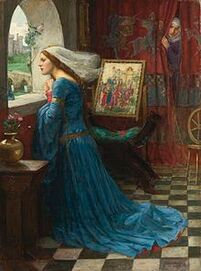 Rosamund is the namesake of the Fair Rosamund of legend Petticoat Government
Rosamund is the namesake of the Fair Rosamund of legend Petticoat GovernmentJust as with Austen, (and scads of other novelists) we have critical, satirical portraits of the upper class. Just as with Austen, we see people who live up to the responsibilities of their rank and position, and others who do not. Mrs. Armytage is an upholder of the traditional values of the squirearchy. She has no use for the Duchess of Spalding, a maneuvering socialite whose daughters are in the mold of Miss Bingley. The decadent Spaldings are set against the upright Duke of Rotheram and his family and the rustic, old-fashioned Maranham sisters, each of whom represents a different caricature of spinsterhood: the Amazon, the female pedant , and the invalid. But the time we spend with the Spaldings at Spalding castle dragged for me: especially the vapid conversations of the foppish Spalding son and the other houseguests.
The Maranham spinsters have a mysterious and beautiful ward living with them. A veil of mystery hangs over the lovely Rosamund Devenport's parentage. Her beauty and simplicity enchants the foppish son of the Duke of Spalding. He comes a-courting, but it’s not easy to get past the three spinsters. Over lunch, the oldest sister testily informs him: “We do not boast, like your mother, the Duchess, six acres of glass in our garden… (but) we can produce an apricot worth eating. The overgrown, washy things your famous Horticultural Societies are poisoning the country with, appear to my palate little better than pumpkins…”
The subtitle of the book, after all, is Female Domination, and it is clear that female domination is not a good thing. Mrs. Armytage’s son and daughter are adults, but they are treated like children. The Duchess of Spaulding dominates her husband to such an extent that he withdraws from family life, like Mr. Bennet but without the humour. He only takes a part in the narrative when his son asks him to bless his marriage with Rosamund Devenport, the girl of unknown parentage. The Duke’s “pride and prejudices” forbids the match until Rosamund's dramatic backstory is finally explained.
Mrs. Armytage’s gentle daughter Sophia and a deserving young man (kept offstage until the end of the novel) are another ill-starred couple, but they don't get a happy ending. Sophia’s suitor doesn’t have enough money to propose marriage. Sophia is doomed to suffer “disappointed hopes” and “blighted affections.” The kindly old vicar, Dr. Grant, consoles and supports her.
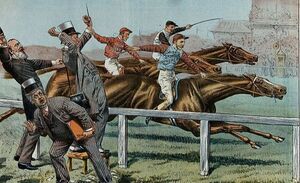 Marian's father is a loud and vulgar racing fan Social Critique?
Marian's father is a loud and vulgar racing fan Social Critique?So is this novel a critique of the snobbery of the upper classes and the stultifying restrictions of society? Not unequivocally. Just as with Austen, we also have scathing portraits of social climbers, people from the lower ranks who only want to be accepted by the upper ranks. They are not presented as sympathetic figures merely by virtue of being from the middling classes. Marian, the daughter-in-law Mrs. Armytage deplores, has an uncle who is a West Indian planter and another relative who is a Bristol merchant. Both of these characters represent the type of nouveaux riches vulgarity that makes Mrs. Armytage shiver.
There is also a rich planter from the Southern United States who comes for a visit and becomes enamored with the idea of marrying into the nobility, although he is so unaccustomed to life in English country-houses that he mistakes a duke for an upper servant.
There are some comic touches but overall, the tone of Mrs. Armytage is darker and a little more didactic than Austen.
I thought the surprise visit of Marian's father to Mrs. Armytage's manor was a masterpiece of psychological realism, and I liked the portrayal of her household of ancient servants who shuffle slowly along through the corridors of the stately home while registering their approval or disapproval of events. Psychological Drama (and spoiler alert)
A contemporary reviewer said of Catherine Gore: "[She delineates] with truth and delicacy, those lighter shades of character by which society is checquered. In her fine appreciation of character, we are reminded of Miss Austen."
What I admired about the first two volumes of Mrs. Armytage was the fact that we saw flawed human beings contending with a difficult situation. The title character has her flaws, but so does her son Arthur. He is a coward who uses his sister Sophia to bear the brunt of parental displeasure. Instead of escorting his new wife to present her to his mother, Arthur sends Marian all by herself, to introduce herself, while he lingers behind in the village. Then, having obtained this wife, with whom he was so infatuated during their courtship, he leaves her to live with her formidable mother-in-law for weeks and months at a time.
But after the character-driven action of the first two volumes, Gore resorted to melodrama to wind up her storylines. Mrs. Armytage goes from being domineering to being insanely unreasonable. A rich uncle appears out of nowhere to leave his fortune to the Sophia's deserving young man; he writes to ask for her hand but Mrs. Armytage destroys the letter. Broken-hearted Sophia dies of Wasting Victorian Heroine Disease (aka consumption). Then Mrs. Armytage is so eager to publicly condemn her daughter-in-law for a perceived indiscretion (of which she is innocent) that she is deaf to the voice of reason.
A last will and testament comes to light which overthrows Mrs. Armytage's entire world; she flees to the continent. Her son and her daughter-in-law suddenly become highly-principled and unselfish. They go searching for her and find her dying in Italy. Arthur and Marian arrive unexpectedly at her villa in the middle of the night. Mrs. Armytage fears that she is going to die in a home invasion: “With hasty steps, the intruders traversed the floor, and approached her; while, overcome by weakness, she sank into a chair under the expectation of an assailing arm—perhaps a mortal blow! A single humble and heartfelt ejaculation to Heaven avowed her apprehensions and her resignation.
“But the arm that encircled her was no hostile arm—the sobs that reached her ear burst from no alien bosom. It was her son—her afflicted son—who was hanging over her! It was Marian who was kneeling at her feet!
“‘Will you receive us?—will you accept us!’ -–faltered Arthur, again embracing her.
“A kiss imprinted on his clasped hands, and the burning tears that fell upon them, silently avouched the repentance and the renewed affections of his mother!” After this climax of filial devotion, Gore wraps up her story swiftly. Mrs. Armytage dies in the bosom of her family, and Arthur and Marian become excellent proprietors of the estate and beloved patrons of their community.
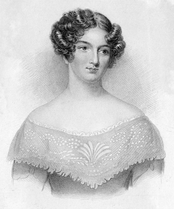 Catherine Gore (1798 – 1861) Catherine Grace Frances Gore was the daughter of a wine merchant; in other words, like most silver fork novelists, she came from the middle classes, not the gentry.
Catherine Gore (1798 – 1861) Catherine Grace Frances Gore was the daughter of a wine merchant; in other words, like most silver fork novelists, she came from the middle classes, not the gentry. An 1839 appraisal of Catherine Gore in the Dublin Review, (also quoted above), says: "We consider Mrs. Gore to be one of the most elegant and unexceptionable of the female writers of the present day; her style is easy and graceful, the plot of her stories simple, and yet not careless, and the tendency of her works almost always excellent;—professedly a moral writer, she has not marred her own purpose by taking a too ambitious line."
She was a prolific novelist, or, as another reviewer -- who was not a fan -- complained, "A year has scarcely elapsed, and this voluminously bad writer inflicts another book upon the public." This reviewer, writing for the Monthly Review, thought Gore's novels were "over-rated." He called Mrs. Armytage “a work without interest, incident, or even good writing to recommend it.” He faulted her novels for “paucity of incident, trifling details of the most uninteresting events, elaborate attempts at description, and interminable conversations.”
I think it's worth noting that Catherine Gore was the chief breadwinner of her family, churning out her novels and short stories while raising ten children. That alone should earn her some respect, as far as I'm concerned.
A modern scholar of the silver fork novel, Edward Copeland, argues that in fact, Mrs. Armytage is a book with layers. It's really an extended allegory about Whig and Tory politics. “Arthur, liberal and generous in spirit and expansive in his sense of class… is a modern Whig… Arthur’s eventual triumph over the narrow principles of his old-style Whig mother… is an example to the nation." The whole thing is symbolic and “thoroughly political.”
Well, yes, this is a novel with a message, but personally, I think when a novelist gives the subtitle Female Domination to a book, it means that her book is about female domination. In addition to showing the consequences of female domination, Gore also explains the cause -- an explanation that wouldn't be necessary if she was just using her title character as an allegorical stand-in for old-style Whigs. Gore, like many other novelists of the era, editorialized about the unfortunate consequences of faulty education -- Mrs. Armytage's faults can be traced to her girlhood. An only child with a willful temper, her moral education was deficient: She was taught to ride, to run, to settle with the steward and housekeeper, to parley with the farmers, to dispute with the tax-gatherers. A little Latin, and a great deal of arithmetic, bounded her accomplishments. Of music she knew nothing… Law and theology, Blackstone and Tillotson, were the studies inculcated by her preceptor, the curate of the parish… (who) discerned in the mind of his pupil a fund of sound and sober sense; and doubted not that it would in time avail to reform her faults of character.”
Female education was a frequent theme in novels of the day, as I've mentioned , and I'll return to that subject soon, in the context of Mansfield Park. Final content advisory for anyone thinking of reading this novel: Mrs. Gore's novels, like most novels of the time, upheld the values of morality, virtue, and charity. Gore shows her pro-abolition sympathies, yet she thought nothing of using a racial slur to describe enslaved persons. The Southern planter is described as a n****r-driver. When the planter marries, we are told “Lady Amabel assured her [mother] that Leonidas [the planter] had determined to give up his n****rs for her sake…” The nouveaux riche West Indian uncle votes for abolition in Parliament even though it is against his interests and he loses "four thousand a year" as a result. His principled stand wins him the respect of Mrs. Armytage's neighbour Lord Rotheram. Gore's pro-abolition sentiments coexist with a patronizing nonchalance which is jarring to modern sensibilities.
Helen Taylor narrates an audio version of Mrs. Armytage at Librivox which I recommend. Additional reading:
Copeland, Edward. The Silver Fork Novel : Fashionable Fiction in the Age of Reform. Cambridge University Press, 2012.
Wilson, Cheryl A. Fashioning the Silver Fork Novel. Pickering & Chatto, 2012. Clutching My Pearls is my ongoing blog series about my take on Jane Austen’s beliefs and ideas, as based on her novels. I’ve also been blogging about now-obscure female authors. For more, click "Authoresses" on the menu at upper right. Click here for the first in the series.
Published on November 15, 2021 00:00
October 12, 2021
CMP#74 "What Excellent Potatoes"
 Clutching My Pearls is an exploration of Jane Austen's art, her times, and her beliefs. Click here for the first in the series. Can traces of Austen be found in the works of other authors? For more on now-obscure authoresses of Austen's time, click on the "Authoresses" category on the right-hand menu.
CMP#74 “What Excellent Potatoes:” Raising Daughters with Arabella Argus
Clutching My Pearls is an exploration of Jane Austen's art, her times, and her beliefs. Click here for the first in the series. Can traces of Austen be found in the works of other authors? For more on now-obscure authoresses of Austen's time, click on the "Authoresses" category on the right-hand menu.
CMP#74 “What Excellent Potatoes:” Raising Daughters with Arabella Argus
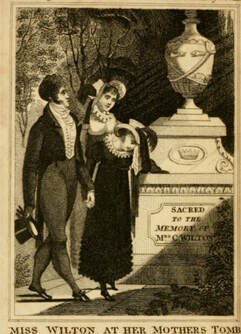 Explicitly Christian message Ostentation and Liberality, an 1821 novel by Arabella Argus, caught my eye because of the title, which is obviously in the tradition of Pride and Prejudice and Sense and Sensibility.
Explicitly Christian message Ostentation and Liberality, an 1821 novel by Arabella Argus, caught my eye because of the title, which is obviously in the tradition of Pride and Prejudice and Sense and Sensibility.And, one of the main characters is a Mr. Austen, a widower who is raising his daughter with the help of a governess. Naturally I wondered if this was a posthumous tribute to Jane Austen.
Ostentation and Liberality is a didactic book aimed at young people and/or their parents. The central conflict is the governess’s efforts to raise her pupil to be virtuous and good. Will Frances grow up to be like her frivolous, heartless, cousins, or will she emulate Miss Colville’s former pupil, the benevolent Lady Jane? A young man is introduced into the narrative, but there is no romance.
Arabella Argus is a pseudonym. We don’t know the author's life dates because we don’t know who Arabella Argus was. We don't even know if Argus was a female, or one person. Her books were published and re-issued between 1810 and 1835, according to the Women's Print History Project. “Argus” is a reference to a figure from Greek mythology, an all-seeing giant covered with eyes.
If you're an Austenite, read on to see if you can spot some Emma similarities in this book... But First, A Digression About Novelistic Technique
I’m becoming increasingly interested in the question: when did certain narrative techniques arise in the development of the novel? When did novelists dispense with introducing their characters to the audience and start sprinkling expository information throughout the novel?
For example, five of the six Jane Austen novels begin, like most novels of her time, with a brief curtain-raiser about the main character or characters. We learn that Catherine Morland’s father is a clergyman, Emma’s father is wealthy and widowed, Sir Walter is a vain baronet, the Dashwoods are a respectable family, and one of the three Ward sisters was lucky to marry a baronet.
The exception is Pride and Prejudice which, after its famous opening line, goes into a conversation between a husband and wife about the new neighbour. We learn a lot more about the family but it is not placed right up front in narration. We don't learn about the entail on the Bennet property until Chapter 13!
This distinction was brought home to me when I started reading The Bristol Heiress. I accidentally began with Volume III instead of Volume I. "Wow," I thought to myself, "this author is really ahead of her time. She’s starting with a conversation between the heroine and her dissolute, debt-ridden aunt, whose affairs have reached a crisis point. Instead of describing who everybody is, what their social standing is and how much money they have, she’s starting the story in media res, (to use the literary term)."
However, I soon discovered my mistake, and went back to Volume I, which in fact, started in the conventional way: “Mr. Percival was the only surviving branch of a genteel, but not opulent family…”
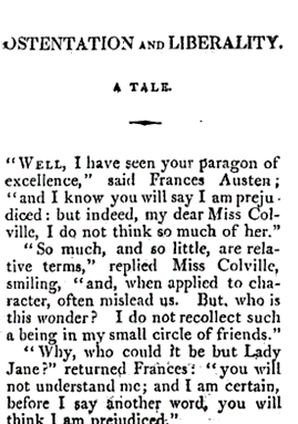 Unconventional opening with dialogue I mention this because Ostentation and Liberality doesn't commence with an explanation of who the main characters are. It launches right into a conversation between a governess and her pupil about a third person, Lady Jane, without explaining who anyone is.
Unconventional opening with dialogue I mention this because Ostentation and Liberality doesn't commence with an explanation of who the main characters are. It launches right into a conversation between a governess and her pupil about a third person, Lady Jane, without explaining who anyone is. I expected the author to circle back and tell us more about the backstory of the family and even the backstory of the governess, because she is a central character in the book. But we don't get their financial or social histories at all, except that they are obviously well off, and the governess, Miss Colville, is distantly related to a respected General. Perhaps this is because the characters aren't really important; they are just walking, talking points of view designed to put certain moral lessons across. Austen, of course, made her characters come alive.
There’s one other stylistic point, which is the use of reported speech presented in quotation marks as though it were dialogue. Austen does this, very occasionally. Here are some examples:
“No—he should not eat. He was not hungry; it would only make him hotter.” [Emma]
“To have it quite in their own family circle was what they had particularly wished. A stranger among them would have been the destruction of all their comfort.” [Mansfield Park]
Auger is the only other author I've noticed using this technique, though no doubt there are others. I have never found a scholarly discussion of this type of reported speech, although surely in the vast corpus of Austen scholarship, somebody has discussed it. Nor have I found a name for this literary technique.
At any rate, here is one of two examples from Ostentation and Liberality: “The air was chilly; they hoped Frances did not think of finishing her sketch that day; their mamma would be lonely; and they begged a servant might order their carriage.”
This technique is used very seldom. I just can't figure out why Austen and Argus choose to use it for certain passages. This reported speech from Mrs. Clay about rain in Persuasion is not encased in quotation marks: she would hardly allow it even to drop at all, and her boots were so thick! much thicker than Miss Anne's; but other bits of indirect speech are in quotation marks. Why? I've no idea.
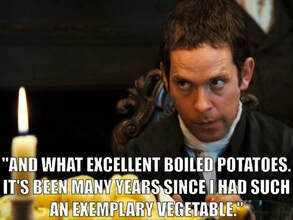 In the movie, of course, but not the book A Proper Upbringing for Daughters
In the movie, of course, but not the book A Proper Upbringing for Daughters Both the governess and the father are the lecture-giving moral arbiters of the book, and in addition, the writer often breaks in with her own lengthy lectures.
How to educate daughters properly is a recurring theme. Mr. Austen argues with Marian’s mother about whether girls should study serious subjects. Mrs. Wilton is a vain and unpleasant woman, so we know that the author does not agree with her character when she says: “There is something vastly unfeminine in a girl’s professing a predilection for studies that belong exclusively to the other sex. No, it is not the study of algebra or geometry that I would wish your daughter to pursue; --she must be a musician, an artist, a linguist; and the accomplishments of dancing must not be omitted.”
Dad disagrees. He won't engage the most fashionable or expensive masters to train Frances. But on the other hand, he doesn’t think his daughter is particularly bright or talented academically (a remark he makes several times). Miss Colville is not working with a little prodigy of genius or virtue, she is just trying to do her best with an ordinary little girl.
Young Frances is tired of hearing about how great Lady Jane is. She complains that Lady Jane’s virtues are “constantly brought forward.” “Do I hear of any thing but Lady Jane’s talents, -- Lady Jane’s liberality, -- Lady Jane’s everything?” Frances is in danger of being influenced by her worldly, snarky, cousins who also resent their neighbour Lady Jane.
Cousin Marian is the Bad Example in the book. She is rude to Lady Jane and Miss Colville, and she even has bad table manners. She invites herself to a party when Frances is entertaining a friend: “’What excellent potatoes!’” the intruder exclaimed, taking one from a dish at some distance from her, and dipping it in the salt she had elegantly strewed upon the table-cloth.”
I presume they were boiled potatoes.
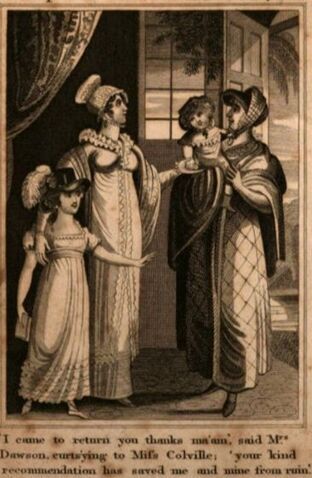 Kindness to our social inferiors Ostentation and Liberality is intended for a young audience but the language, at least to my eyes, is quite adult and formal. A juvenile reader of the day would have been expected to understand the following dialogue: (This is from a general who discovers that a young man who was his house guest drew an unflattering cartoon of him. The general says:)
Kindness to our social inferiors Ostentation and Liberality is intended for a young audience but the language, at least to my eyes, is quite adult and formal. A juvenile reader of the day would have been expected to understand the following dialogue: (This is from a general who discovers that a young man who was his house guest drew an unflattering cartoon of him. The general says:)“A boy caricaturist can only excite the contempt of those he presumes to satirize; --at least, such would be the opinion of most persons upon this occasion. However, as one who knows the world, and has been accustomed to observe those rules of civil life which can alone enable man to live in fellowship with man, I warn you that this habit, if indulged, may lead to the commission of a crime of the deepest turpitude; --an insult of this nature, at a more advanced age, would expose you to a challenge from your equal in society; and, though it is not quite clear to me that the professed satirist is really a courageous person, he of all men should avoid such a contest. For of this I am assured, that whoever pursues a practise so void of liberality, must be deficient in those benevolent feelings, that just temper of mind, which can make a mere mortal regard the future with becoming humility.”
Could an eleven-year-old understand that the General is talking about dueling, death, and salvation?
Books like this do offer a valuable source of insight into the language, slang, and customs of the day. Marian laughs with astonishment when a vulgar and badly-dressed lady knocks at their front door. “Now here is an old quiz of a woman. Oh dear, she’s spying out the numbers. Is she a friend of yours, Frances? I cannot say much for her elegance. Hark—a double knock! Well, I declare I should have expected to have seen her go down the area.”
This tells us that there is a separate servants' entrance for the Austen's Harley Street residence and perhaps different knocks were used by the gentry and by tradesmen. Austen's characters Isabella and John Thorpe also used the term "quiz" in this derogatory way, to laugh at people's appearance. As it turns out, the vulgar Mrs. Cox is related to Marian, and not Frances. Marian is rude to her, which distresses her mother, because Mrs. Cox may be vulgar, but she's rich! She, like other minor characters, don't play a decisive role in the plot. There are put there to demonstrate moral lessons. And, there is barely any plot. Some people die, some repent.
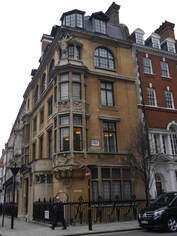 Harley Street Wiki Commons As I mentioned, the novel is pretty finger-waggy, as befits a book for young people. The emphasis is on drawing a distinction between ostentation (what today we would call performative behaviour) and liberality (being generous with your money, judging other people generously, giving generously of your time and attention to others). The terms ostentation and liberality are brought up frequently and always given in italics. Giving charity usefully and unobtrusively is stressed, with various examples of proper and improper conduct.
Harley Street Wiki Commons As I mentioned, the novel is pretty finger-waggy, as befits a book for young people. The emphasis is on drawing a distinction between ostentation (what today we would call performative behaviour) and liberality (being generous with your money, judging other people generously, giving generously of your time and attention to others). The terms ostentation and liberality are brought up frequently and always given in italics. Giving charity usefully and unobtrusively is stressed, with various examples of proper and improper conduct.Miss Colville corrects Frances's use of English as well as her morals and manners: she gets a little lecture on the correct use of the word ‘nice:’ “'For instance, Mrs. Wilton is rich, dresses well, and (of course), is never dirty: still, the word ‘nice’ can hardly apply to her appearance. She may be pleasing, agreeable, or elegant; but I do not see the fitness of calling her nice. Your cousins being ‘nice girls,’ is liable to the same objection.'” And—yes! Miss Colville lectures Frances on the difference between pride and vanity. That’s two novels in a row I’ve read that have somebody explaining the difference between pride and vanity. I read the book to the end (skimming past many of the lectures) to see if there were any other parallels to Emma, but there are not. We never learn anything about Lady Jane’s inner life, or even how old she is. We don't learn Miss Colville's backstory. We don’t follow Frances to adulthood. There isn’t even a throwaway line like, “And then she married that nice young man who used to hang around the house in Volume I for no discernable plot reason." We learn only that “Marian attained a place in the esteem of Lady Jane Milner; and Lady Jane continued to be the model by which Mr. Austen hoped to fashion his own daughter. Frances gave some promises that greatly sanctioned this desire of her father’s…” That is, there were indications that Frances might grow up to be as virtuous as Lady Jane.
The book bears little resemblance to Austen in terms of plot, tone, or literary merit, but can the name of "Austen" be a mere coincidence? Or is it a tribute from a fan who admired, but could not emulate, a favourite author?
Next post: another Austen admirer. The Monthly Review said: "Some useful lessons may be learned from this tale; though even Miss Colville, the governess who is here represented as furnishing hints for moral improvement, is not always perfectly grammatical in her expressions." Although Miss Colville lectures the girls on proper English usage, the reviewer found fault with some of her expressions as well and also took exception to the use of "left" for "departed," calling it a "low servant's phrase."
Arabella Argus wrote several books with animals as the main characters. The famous children’s classic Black Beauty “shares many actual scenes” with Argus’s 1815 story The Adventures of a Donkey, according to scholar Tess Cosslett.
Cosslett, Tess. Talking Animals in British Children's Fiction, 1786-1914. Ashgate, 2006.
Published on October 12, 2021 00:00
October 3, 2021
CMP#73 And Then Things Got Weird
 CMP#73 Dinner-table Debate in
Edward
: And Then Things Got Weird
CMP#73 Dinner-table Debate in
Edward
: And Then Things Got Weird
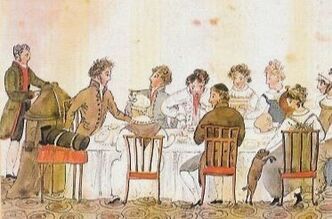 Awkward dinner-party conversation In my last post, I discussed the plot and themes of the 1796 novel Edward, written by the Scottish author John Moore. Moore’s novel featured a large cast of characters who often discussed current events and serious topics; in addition Moore inserted his own brief editorials directly into the narrative. As mentioned, he touched on quack doctors, unrest in France, and the poor pay given to England’s soldiers. His plot incorporated social criticism of foolish spendthrifts and vain coquettes. And he unequivocally condemned slavery.
Awkward dinner-party conversation In my last post, I discussed the plot and themes of the 1796 novel Edward, written by the Scottish author John Moore. Moore’s novel featured a large cast of characters who often discussed current events and serious topics; in addition Moore inserted his own brief editorials directly into the narrative. As mentioned, he touched on quack doctors, unrest in France, and the poor pay given to England’s soldiers. His plot incorporated social criticism of foolish spendthrifts and vain coquettes. And he unequivocally condemned slavery.Now, I’m back to banging the drum about the fact that many, many, 18th-century authors discussed slavery more extensively and explicitly than Jane Austen, yet modern academia has focused a giant microscope on references to slavery (or imputed references) in her novels. The opinions of the beloved author are a matter of intense investigation and speculation. I believe this is because some people can only read Austen with a self-approving conscience if they can say she was an ardent abolitionist. As professor Patricia A. Matthews wrote, some of her "students who were Jane Austen fans felt instantly complicit for liking stories where slavery might be present without an explicit critique."
Well, Moore is explicit. You don't need the aid of scholarly divination to understand John Moore's position on slavery. His attitude doesn't have to be sifted and searched for. He condemned slavery in his first novel, Zeluco, and he wrote a bold and shocking conversation about slavery in Edward. The tone of his criticism is as harsh as the writer (Jonathan Swift) that he invokes. In fact, it will be difficult reading for some, so be forewarned... Just a reminder that the slave trade, but not slavery, was banished in England and its possessions in 1807. Moore calls for an end to slavery altogether in this 1796 novel. In contrast, Mansfield Park was published after the abolition of the slave trade but before the abolition of slavery.
In Volume II, chapter 57 of Edward, Moore assembles some major and minor characters at a dinner party at the home of Sir Mathew Maukish. We first meet Sir Mathew in Volume I when he runs over a crippled soldier with his carriage. A dozen ladies and gentlemen are present at the banquet, but not the hero, Edward.
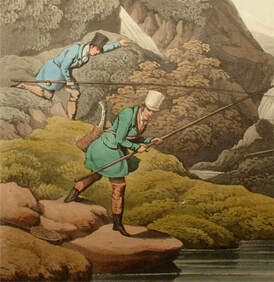 Salmon fishing The main speakers are:
Salmon fishing The main speakers are:Mr. Barnet, a lazy gourmand, whom we met in my previous post. He isn’t very bright and like Austen’s Mr. Rushworth, is not very much aware of this fact.
Mr. Wormwood, the sardonic neighbour of the Barnet family. He likes eating at Mr. Barnet’s well-appointed table but takes subtle digs at him.
Mr. Temple, a respectable, virtuous clergyman and a moral arbiter of the novel.
Colonel Snug. Moore quotes Swift in describing him: "To all mankind a constant friend, provided they had cash to lend."
Mr. Grinder, an overseer of a slave plantation in the West Indies who has “accumulated a considerable fortune” and plans to buy property in England. He is looking at some land owned by Sir Mathew, which is why he’s been invited to dinner.
The conversation starts with Mr. Temple declining to eat any salmon when he learns that it’s been “crimped,” meaning that its flesh was slashed and it was left alive in water for a few hours before being cooked. This is a technique which is supposed to improve the texture of the flesh.
The guests debate the topic of animal cruelty with their hosts. Mr. Barnet adds that it’s too bad carnivorous animals aren’t tasty to eat, because “it would furnish a greater variety to the table and would be a comfort to tender-hearted people like my wife who feel some compunction in killing lamb and chicken.”
“’Might we not be in danger of eating one another?’" asks Mr. Temple.
This jest reminds Colonel Snug of Jonathan Swift's famous essay A Modest Proposal. He remarks: "there was a proposal for bringing the children of poor people in Ireland to market in times of scarcity.”
 Here's where it gets weird... "I could not help suspecting that the author meant it in jest," Mr. Grinder says. “’I confess I am not clear that a scarcity of provisions could justify the supplying the market in the manner he proposes.'"
Here's where it gets weird... "I could not help suspecting that the author meant it in jest," Mr. Grinder says. “’I confess I am not clear that a scarcity of provisions could justify the supplying the market in the manner he proposes.'" The other gentlemen are amused to discover that Mr. Grinder isn't sure whether or not Swift's essay is a satire. Perhaps Swift really did think the Irish should sell their children to be eaten!
Wormwood, in a mischievous mood, tries to persuade Mr. Grinder that Swift really meant what he said: "for that treatise is written with an air of great seriousness.'" “‘I question much,’ replied Grinder, 'whether it could be legally adopted in Great Britain or Ireland, even during a famine.’
“’But in case of a famine in the West Indies?’ rejoined Mr. Wormwood.
“‘Why, why, even there,’ answered Mr. Ginder, after a little demure, ‘I think the scheme should be permitted to extend only to a man’s indisputed property, which he has honestly bought with his money, or bred on his estate, and which he has a right, by the laws of God and man, to dispose of as he pleases, and as is most for his advantage.’
“‘In which you call a man’s indisputed property... do you comprehend the children of his negro slaves?’ said Wormwood.
“‘I unquestionably do,’ replied Grinder.
“‘I expected there would be a clause in their favour,” said Wormwood.
“‘For my part,’ cried Barnet, [who doesn’t understand that Wormwood is just stringing Mr. Grinder along] ‘hang me if I would not rather starve than eat a morsel of either a white child or a black.’
“‘If all the world were as squeamish as you, brother,” said Mr. Temple, “the black children would reap no benefit from the clause which Mr. Grinder would leave in their favour.’
“‘In their favour!’ repeated Grinder.
“‘Yes, Sir,’ rejoined Mr. Temple, ‘I should think it a favour to slaughter them during their infancy, rather than rear them to the miserable lives the generality of them do.’
From here we go into a straightforward slavery debate between Mr. Grinder and Mr. Temple, involving the typical arguments frequently made at the time.
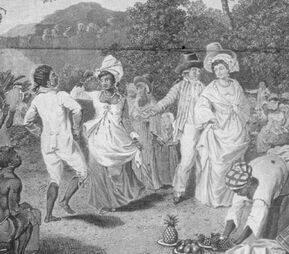 “‘It is a great mistake to imagine that the slaves pass miserable lives,’ said Mr. Grinder: ‘I dare swear you never was in the West Indies, Sir.’
“‘It is a great mistake to imagine that the slaves pass miserable lives,’ said Mr. Grinder: ‘I dare swear you never was in the West Indies, Sir.’“‘I never was,’ answered Mr. Temple, ‘but I have conversed with men of veracity, who, after residing there several years, acknowledged that the slaves of men of cool tempers and mild dispositions are treated with humanity, and even kindness, but at the same time related such stories of the cruelty exercised upon slaves by men of avaricious or unfeeling characters, as cannot be heard without indignation and horror.’
“‘It is all a mistake, I assure you, Sir,’ replied Grinder, “many men of honour, both of the army and navy, who have been witnesses to it, have declared that the slaves are well used.’
“’I am convinced, Sir,’ resumed Mr. Temple, ‘that when the gentlemen of the navy or army are invited to dine in the West Indies, the punishment of slaves forms no part of the entertainment. That is an exhibition which the landlord will naturally keep out of the sight or hearing of his guests; of course those gentlemen will not declare what they have neither seen nor heard.’
“‘I do assure you, Sir,’ repeated Mr. Grinder, “that the negro slaves in the West Indies are the happiest class of people on the face of the earth; --they are, indeed, Sir.'
“’Pray, Sir, if it is not too much trouble,’ said Mr. Temple, ‘will you be so obliging as to explain this matter? I am sure it will afford me, and I dare say this whole company, a great deal of pleasure to know that so many of our fellow-creatures, whom we thought in a very wretched condition, are, on the contrary, the happiest of mankind. Pray, Mr. Grinder, in what does this happiness of theirs consist?’
“‘Consist! Consist, Sir!’ answered Mr. Grinder; ‘why it consists in this, that they have nothing to care for.’
"‘A man who is robbed or cheated or all he has, or who never had any thing, enjoys that kind of happiness,’ said Mr. Temple.
“‘Do you not know, resumed Grinder, ‘that the slaves in the West Indies have everything provided for them?”
“‘They have whips in abundance provided for them,’ replied Mr. Temple.
“‘And there is no scarcity of drivers,’ added Wormwood.
“‘It is easy for those who have no West India estates to speak against the slave-trade’ said Grinder, ‘but if you ever come to have that kind of property, you will then be sensible of the propriety of what you now condemn.’
“‘That is a retort which is very often made,’ answered Mr. Temple; ‘yet it amounts to no more than this, that some who now condemn cruelty, might themselves act cruelly… a wise and humane government should take care that none of its subjects have any interest in being cruel; and lest some should have so strong a propensity to it as to act with cruelty… such a government will put It out of their power, by banishing slavery from every country subject to its laws.”
At this point, Lady Maukish interrupts the debate and offers Mr. Wormwood some larks to eat, and the discussion veers back to animal cruelty.
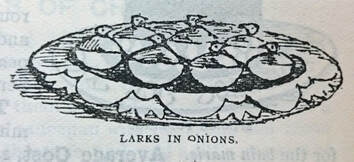 Mrs. Beeton's Cookbook First, as a matter of novelistic technique, this anti-slavery editorial is dropped into the novel and never referred to again. It has no bearing on the plot, except insofar as it further exhibits the personalities of some of the characters. The character of Mr. Grinder the overseer never appears again. He was brought into the novel exclusively for this conversation.
Mrs. Beeton's Cookbook First, as a matter of novelistic technique, this anti-slavery editorial is dropped into the novel and never referred to again. It has no bearing on the plot, except insofar as it further exhibits the personalities of some of the characters. The character of Mr. Grinder the overseer never appears again. He was brought into the novel exclusively for this conversation. Back to the matter of the historical and cultural significance of the slavery debate: as I’ve been saying , if you read 18th century literature to interrogate the author's attitude about slavery, (as opposed to reading literature for its excellence) I think studying the previous conversation in Edward makes more sense than another deep dive into the “ dead silence ” of Mansfield Park.
"Austen is an author who takes on some of the central issues of her age," declares historian Robert Morrison. "I admire her for bringing [the issue of slavery] up in Mansfield Park." The suggestion is that Austen is different from, or even braver than, her contemporaries. Well, compared to who? Here are two more posts which extensively quote 18th-century novels that contain discussions or depictions of slavery which are far more explicit than Austen in "bringing it up." These authors deserve admiration as well, don't they? I have written previously about the fact that even authors who were pro-abolition were not above using the West Indies (specifically West Indian fortunes) as a plot device.
And as an example of treating the West Indies with levity, there is a minor, non-speaking character of colour in Edward, referred to only as “The Mulatto.” "The Mulatto" is the heir of a West Indian fortune who has come to England to live in splendour. In keeping with many portrayals of West Indians in novels of this period, he is a figure of some ridicule. "The Mulatto" has more money than taste. He's gullible. He over-decorates his house. His morals are also suspect because he keeps a string of mistresses. His money is welcome but he is not welcome as a dinner guest.
John Moore's novel has a large cast of characters and some of them, like "The Mulatto," have virtually no effect on the plot. "The Mulatto" could have been omitted from the novel entirely. Why is he even there?
Moore was indignantly against slavery but he still used a nouveaux riche West Indian as a target of satire.
We have no idea what role Miss Lambe was going to play in Sanditon, although it is generally assumed that the portrayal of the "chilly and tender" heiress was going to be a sympathetic one. Patricia A. Matthews, "Jane Austen and the Abolitionist Turn." Texas Studies in Literature and Language, vol. 61 no. 4, 2019, p. 345-361I Clutching My Pearls is my ongoing blog series about my take on Jane Austen’s beliefs and ideas, as based on her novels. Click here for the first in the series.
Published on October 03, 2021 00:00
September 27, 2021
CMP#72 A Serious Novel
 “Dr. John Moore (1729-1802) was a man of the Enlightenment who wrote novels during the Revolutionary decade.”
“Dr. John Moore (1729-1802) was a man of the Enlightenment who wrote novels during the Revolutionary decade.” "Moore's novels helped establish the 'modern novel' as no longer just the diversion of leisured middle-class ladies and their female servants (the widely held view at the time), but as something fit for 'enlightened' men (and women) to read." -- Scholar Gary Kelly on John Moore CMP#72 A Serious Novel, not like one of those trashy novels
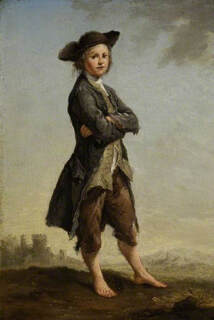 You can safely embark on an 18th century novel about a foundling boy with the assurance that the mystery of his true parentage will be solved, probably by means of an amazing coincidence. The only suspenseful part is the question of how did he, a boy of good family, end up as a foundling in the first place.
You can safely embark on an 18th century novel about a foundling boy with the assurance that the mystery of his true parentage will be solved, probably by means of an amazing coincidence. The only suspenseful part is the question of how did he, a boy of good family, end up as a foundling in the first place.In his 1796 novel Edward, author John Moore does provide the answer, but first he takes us on a great many detours. As an early reviewer of Edward said in The Analytical Review, “the history of Edward is but the slender thread on which a variety of different incidents are strung, to exhibit... caricatured characters.”
I started on Edward because I had read somewhere that it contained a portrait of a hard-drinking, riding-to-hounds sort of clergyman. I was interested in sampling novels that were critical of the clergy, because of the popular idea that Jane Austen was daringly critical with her portraits of Mr. Collins, Mr. Elton, and Dr. Grant. However, Edward: Various Views of Human Nature, Taken from Life and Manners, Chiefly in England, does not have that kind of a clergyman. There is only a passing sneer from a gambler named Mr. Shuffle about the drinking habits of clergymen and another passing sneer from an effete aristocrat about their gluttony. In other words, the critiques of clergymen come from disreputable characters in the book.
At any rate, I came for the clergyman but stayed for the orphan, plucky little Edward Evilen.
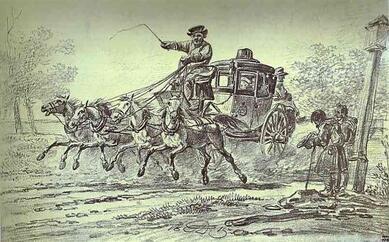 This review contains spoilers.
This review contains spoilers. The tale opens with a benevolent gentlewoman, Mrs. Barnet, returning home after taking her daughter to boarding school. Her post-chaise breaks down, so she shares a stage-coach with a poor village woman and an orphan. The village woman is paid a pittance to take care of several foundlings at her cottage in the country. Mrs. Barnet is smitten with the little orphan boy and longs to adopt him, if only she can persuade her husband to go along with her plan. After we're introduced to little Edward, we go into a lengthy backstory about his foster parents, Mrs. Barnet and her husband. And Mr. Barnet's father. And his father's father. As I’ve discussed, novels of Austen’s time focused on class and money, and whenever a new character is introduced, the background and social standing of that character is explained, along with their personality traits. This is certainly the case with this novel.
Mr. Barnet is rich (thanks to inherited wealth), self-satisfied, and not very bright, and his life revolves around the dinner table. He's a gently amusing character, especially when he makes tactless remarks. One "peculiarity” of his character was “that while he gave himself little or no concern about the distresses of any of the human race, he would have thought the whole human race well employed in relieving his; and if any of his acquaintance seemed to enjoy ease or comfort, when he laboured under sickness or pain, he stated it as a clear sign of a selfish and unfeeling disposition.”
Luckily, Mrs. Barnet looks after her dim-bulb of a husband and gently urges him into doing charitable things, like providing a home for Edward. We meet some of the Barnet's relations and neighbours, including the virtuous clergyman Mr. Temple and his wife, and some less admirable folks: vapid aristocrats who are courted by social-climbing, useless drones who live off the wealth acquired by their merchant fathers.
There are a few people from the bottom of the social rung, such as a crippled old soldier. We meet the old soldier when an aristocrat runs him over with his carriage, actually.
All of these characters and their various situations in life enable John Moore to introduce his chosen topics, including primogeniture, the government’s treatment of soldiers, revolution in France, and a hard-hitting conversation about slavery.
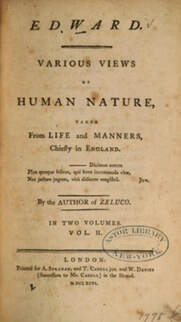 The serious topics canvassed in John Moore’s three novels are an indication that he intended his works for a thoughtful, educated audience. As scholar Gary Kelly explained, Moore deliberately positioned his novels as fit for serious, intellectual, people to read. His works were published in handsome, durable bindings, on good-quality paper, in contrast to the cheap three volume novels of the day. Scholar Gary Kelly explained: “Moore's success in the 1790s was considerable: he gained respect for the novel from those who would otherwise despise it as the ‘trash of the circulating libraries’ (as novels were often called at that time)."
The serious topics canvassed in John Moore’s three novels are an indication that he intended his works for a thoughtful, educated audience. As scholar Gary Kelly explained, Moore deliberately positioned his novels as fit for serious, intellectual, people to read. His works were published in handsome, durable bindings, on good-quality paper, in contrast to the cheap three volume novels of the day. Scholar Gary Kelly explained: “Moore's success in the 1790s was considerable: he gained respect for the novel from those who would otherwise despise it as the ‘trash of the circulating libraries’ (as novels were often called at that time)." Moore was a physician; in fact, he was studying medicine on the continent when he was only 17 years old, which explains why Edward includes a lengthy segment on quack doctors and the damage they do.
Here’s another editorial aside that Moore inserted about an aristocratic family which should be of interest to Austenites: “The character of the mother and son were different in various points, and particularly in this, that the former had more vanity than pride, and the latter more pride than vanity. Those qualities are sometimes used as synonymous, although essentially different: pride, being founded on the opinion people have of their own merit; can support itself in spite of the neglect or disapprobation of others; whereas vanity lives on the applause and admiration of those around…”
This editorial goes on for a few more paragraphs, but you get the idea—this is why the Bennet sisters didn’t think Mary’s remarks on pride versus vanity were pithy or profound, as people do today; they recognized them as a common and commonplace remark to be found in many other books of the day.
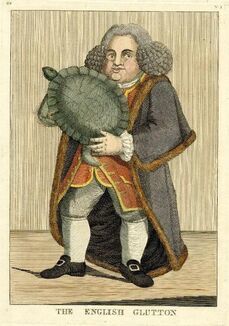 Despite the intellectual tone, the plot and tropes of Edward are typical of a novel of sentiment. For example, various characters are shuffled onstage and offstage by sending them to, or retrieving them from, Europe or the West or East Indies. When exile is not enough, Moore is ruthless about killing off his characters when it serves his purpose. Mr. Barnet eats himself to death when he goes to a banquet in London: “At this sumptuous feast, he found in the same course of his three favorite dishes, namely, Stewed Carp, Turtle, and Venison, any one of which, as he himself used to say, were sufficient with a few other plain dishes for his dinner at any time! But unfortunately on the present occasion, meeting with all the three at once, he indulged so much in each that he was seized that same evening with an indigestion, of which he died the next day.” (Shades of Dr. Grant, anyone?)
Despite the intellectual tone, the plot and tropes of Edward are typical of a novel of sentiment. For example, various characters are shuffled onstage and offstage by sending them to, or retrieving them from, Europe or the West or East Indies. When exile is not enough, Moore is ruthless about killing off his characters when it serves his purpose. Mr. Barnet eats himself to death when he goes to a banquet in London: “At this sumptuous feast, he found in the same course of his three favorite dishes, namely, Stewed Carp, Turtle, and Venison, any one of which, as he himself used to say, were sufficient with a few other plain dishes for his dinner at any time! But unfortunately on the present occasion, meeting with all the three at once, he indulged so much in each that he was seized that same evening with an indigestion, of which he died the next day.” (Shades of Dr. Grant, anyone?)Meanwhile, Edward grows into a handsome, virtuous, well-educated young man, and he falls in love with the beautiful and intelligent Caroline Huntly. Moore knew that it was requisite to build up some obstacles and some suspense about the successful outcome of their love affair. There is, of course, a class barrier in the way. As well, Edward is diffident and humble. He knows Caroline is grateful to him for rescuing her from a rabid dog, but he thinks it would be conceited to assume that she loves him.
Moore’s editorial remark about male self-delusion still has resonance today: “Edward had often remarked the ridiculous vanity with which some men interpret in their own favour the most common piece of politeness, or the slenderest attention from a woman. Nothing appeared to him more contemptible than this coxcomical species of self-conceit.”
Secretly in love with Edward, Caroline politely but firmly turns down an offer of marriage from the rich aristocrat Mr. Ruby, much to the chagrin of her guardian, Mrs. Nevile. Still, Mrs. Nevile loves Caroline and wants her to be happy: “For while Mrs. Nevile was sensible that many women have made most unhappy marriages by mistaking transient fancy for a permanent passion, she also knew that many have been rendered miserable for life by the tyrannical opposition of parents to the affections of their children, even when fixed on objects of the most intrinsic worth. ‘Heaven forbid,’ said she, ‘that I should make use of the authority and influence which my friend transmitted to me over her child in such a manner as to render her unhappy!”
The impasse is solved when we discover that Edward has a trifecta of orphan-identification tropes: a mulberry-coloured birthmark on his arm, his name stitched into his baby cap, and he is wearing a special locket which matches the other half of a locket worn by his real mother! Plus, he's a dead ringer for his dad! And we finally learn the tragic sequence of events which led to little Edward being left at a foundling home.
As The Analytical Review said, Edward "discovers his parent at the critical moment of fate, to spare him the confusion of entering into any profession. Chance, indeed, is eminently the friend of this hero, on all occasions.” Yes, both the hero and heroine are supplied with a rich uncle, so Edward, who has studied for the law, does not have to work. Although Moore shows respect for hard-working merchants and contempt for effete aristocrats, the ideal situation for the hero is to end up with an independent fortune. Likewise, Edward's happiness can't come about until it is established that he is of good family, the grandson of an earl. Enlightenment thinkers like Moore might have shown us the way to a more rational, humane, and egalitarian world, but 18th-century society was still extremely hidebound on matters of class and birth.
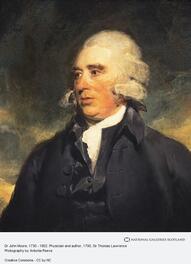 John Moore, FRSE I can find few references to Edward in the current academic literature. All three of John Moore's novels (he also wrote travel books) were written in the latter years of his life. His last novel, Mordaunt, was published a few years before his death at age 72. Moore’s first novel, Zeluco, about an arch-villain, was widely read and admired, and it influenced Byron and other writers.
John Moore, FRSE I can find few references to Edward in the current academic literature. All three of John Moore's novels (he also wrote travel books) were written in the latter years of his life. His last novel, Mordaunt, was published a few years before his death at age 72. Moore’s first novel, Zeluco, about an arch-villain, was widely read and admired, and it influenced Byron and other writers. Gary Kelly remarks, "The style of Moore’s novels… advertises their quality as ‘serious’ literature. Moore’s novels were designed to seem dated, and thereby to seem authoritative, perhaps even ‘classic,’ relative to mere ‘novels of the day.’ Yet this fact has resulted in their being plunged into a deeper oblivion for modern criticism and literary history. They seem stiff, overly didactic…” Kelly also notes that Jane Austen refused to use this kind of “philosophical and didactic form.”
A mid-19th century biographer says: "As a novelist, [Moore] showed no extraordinary felicity in the department of invention; no great powers of diversifying his characters, or ease in conducting his narrative. The main quality of his works is that particular species of sardonic wit, with which they are indeed perhaps profusely tinctured, but which frequently confers a grace and poignancy on the general strain of good sense and judicious observation, that pervades the whole of them."
Yes, John Moore's narrative voice, and his character Mr. Wormwood, both have a certain Mr. Bennet-like sarcastic quality in Edward. More from Mr. Wormwood in the next post which takes up what Moore had to say about slavery. More about John Moore here. Review of Edward.-various views of human nature, taken from life and manners, chiefly in England. The Analytical Review : Or, History of Literature, 1797 25(1), 23-25.
Kelly, Gary. “Enlightenment and Revolution: The Philosophical Novels of Dr John Moore.” Eighteenth-Century Fiction, vol. 1, no. 3, 1989, pp. 219–238.
Published on September 27, 2021 16:26



